CRIMINAL LAW = PENAL LAW THE STRUCTURE

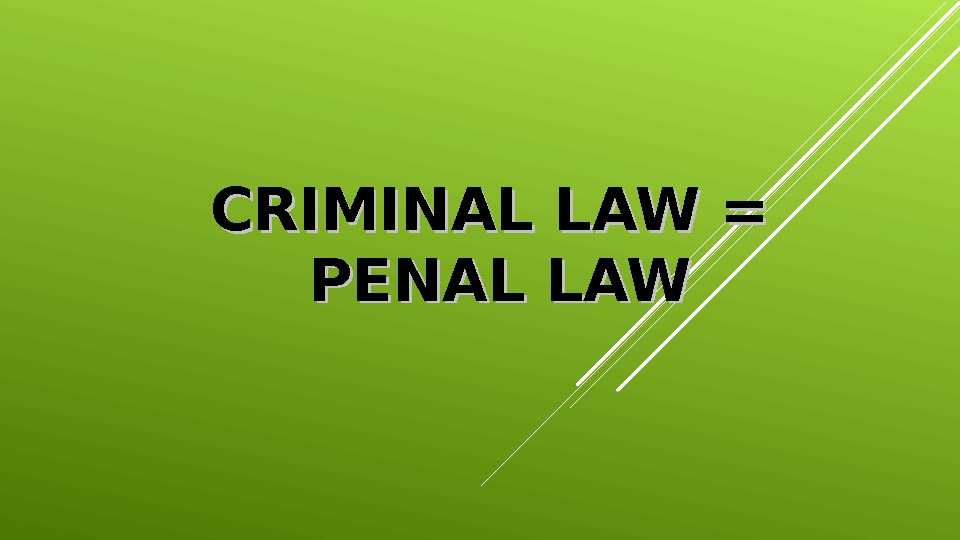
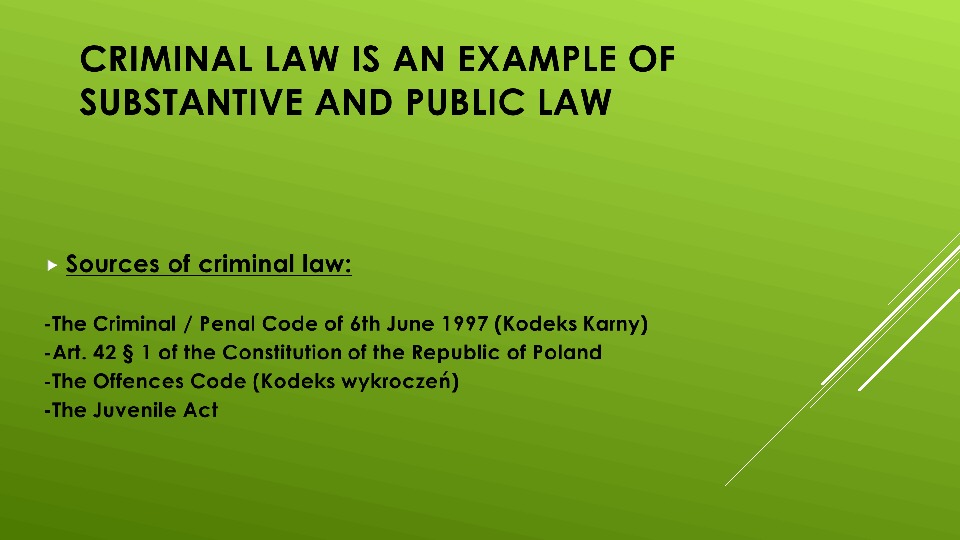
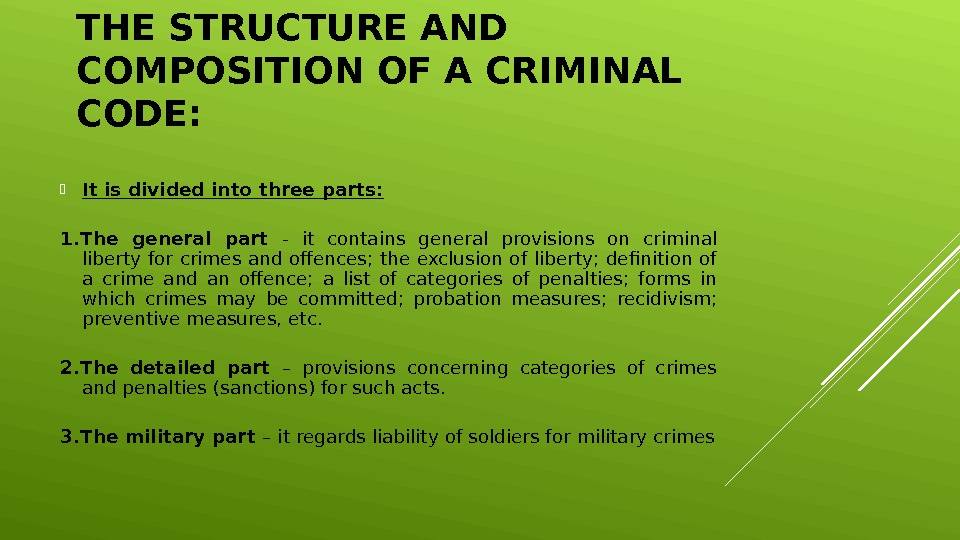
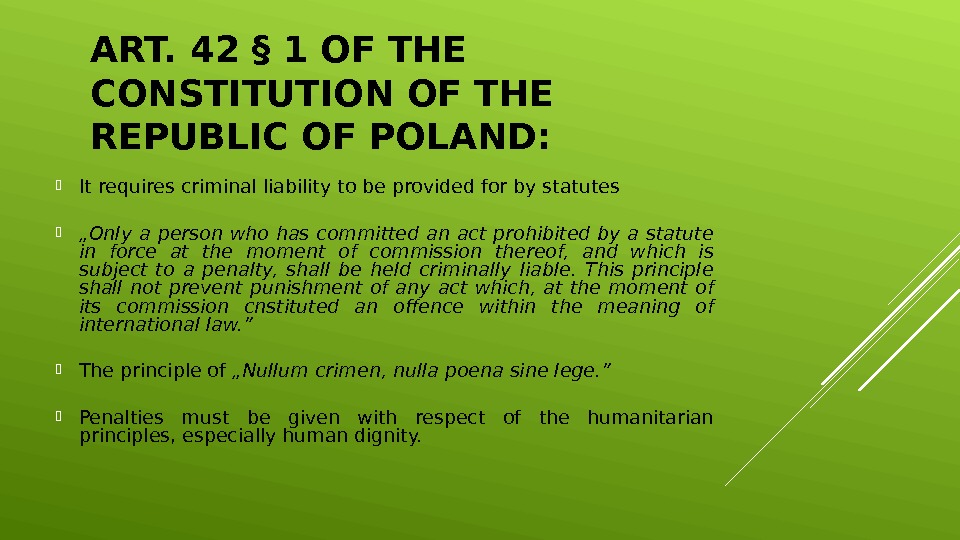
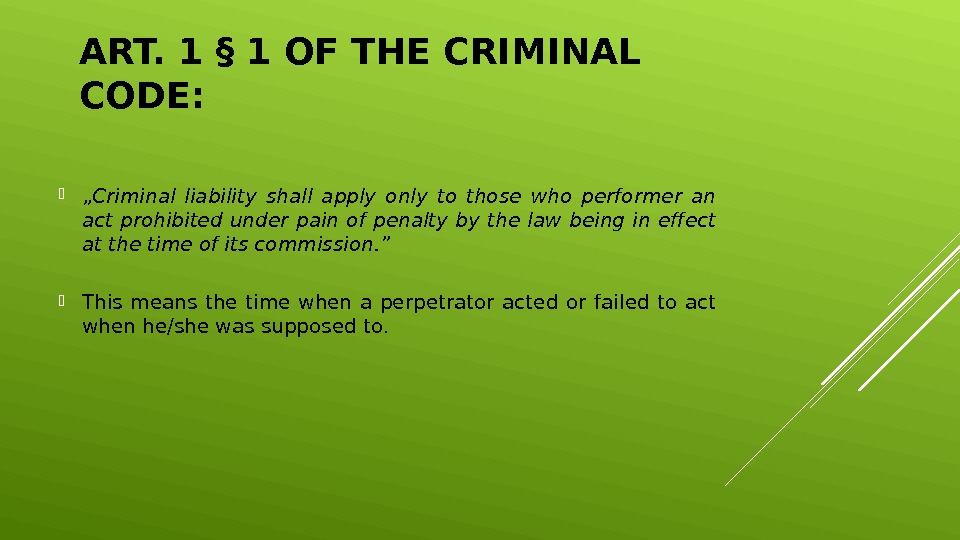
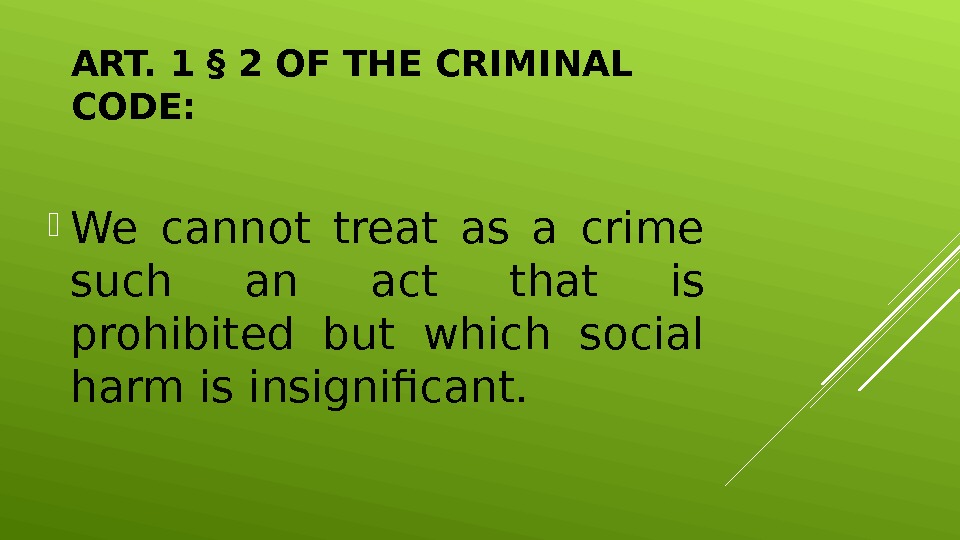
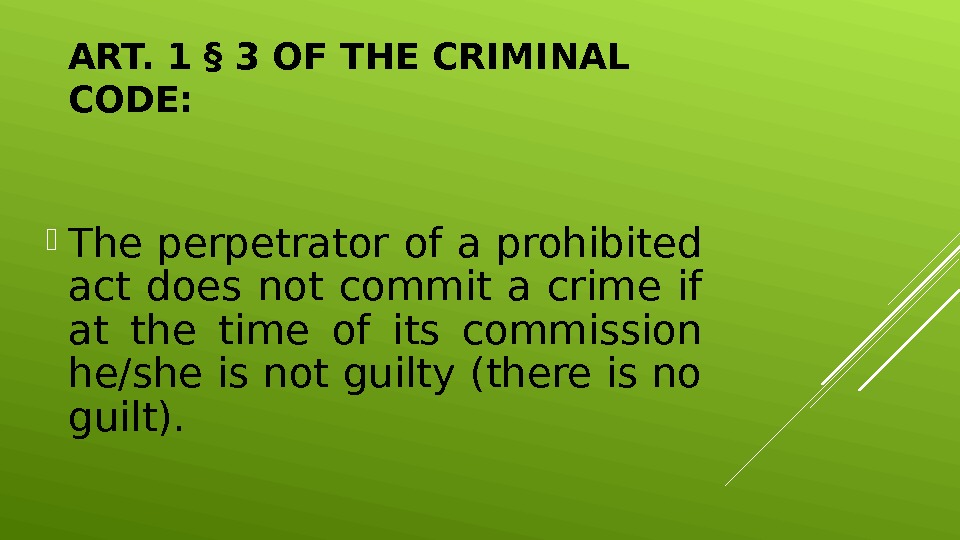
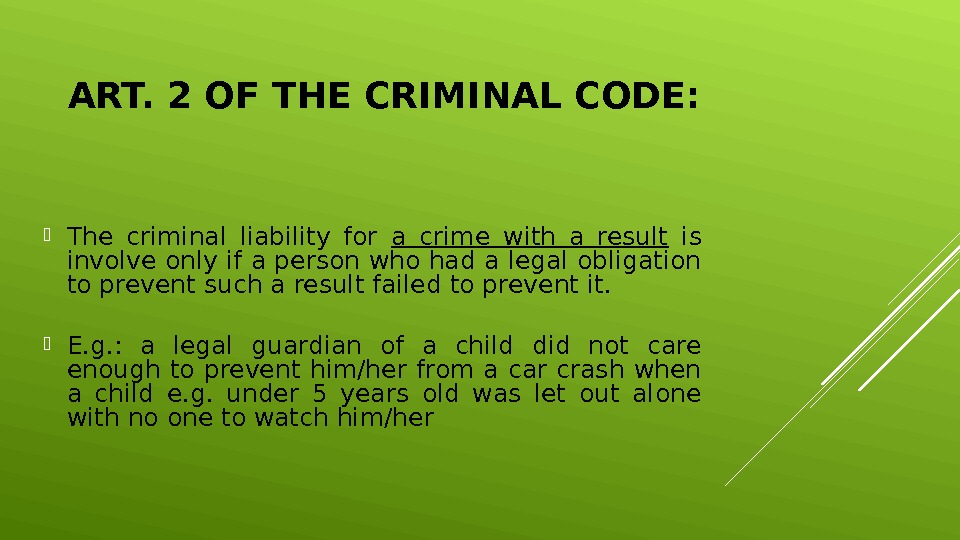
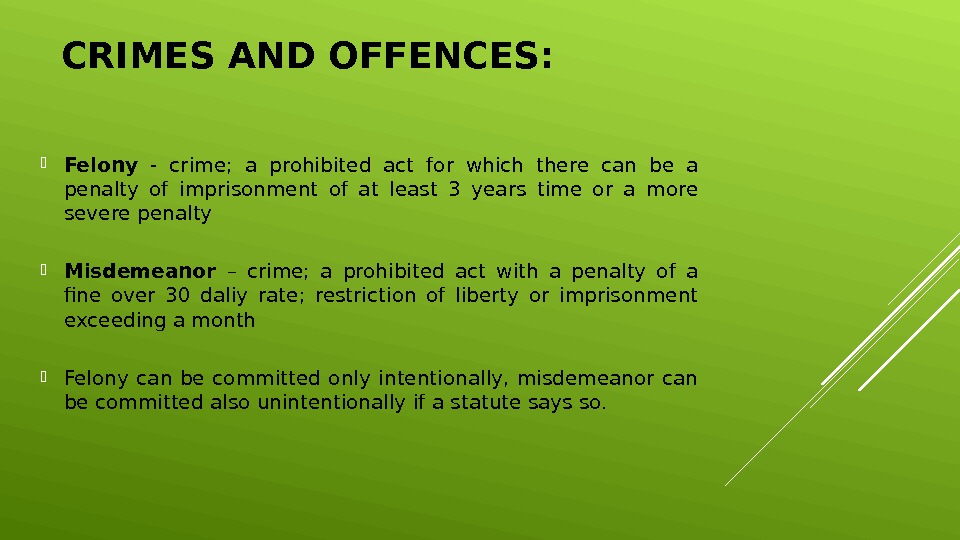
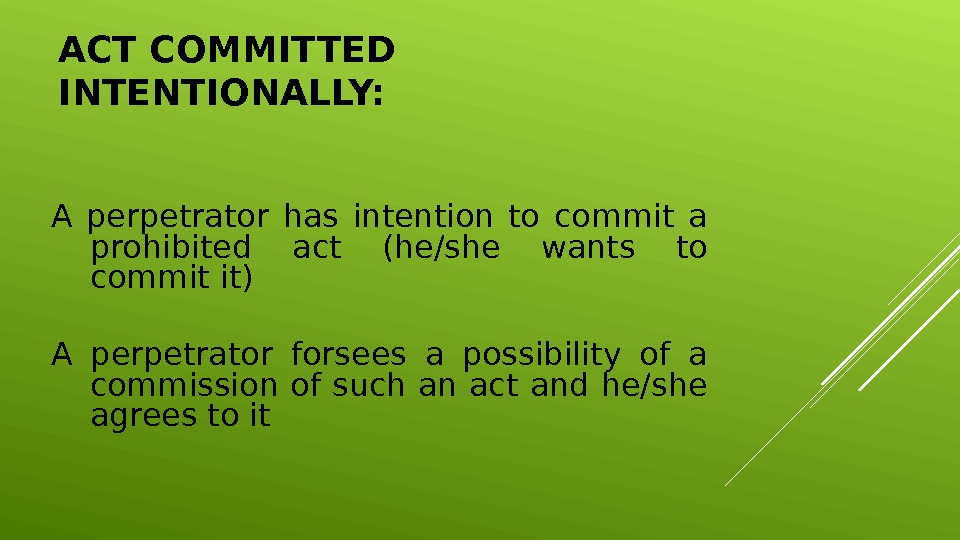
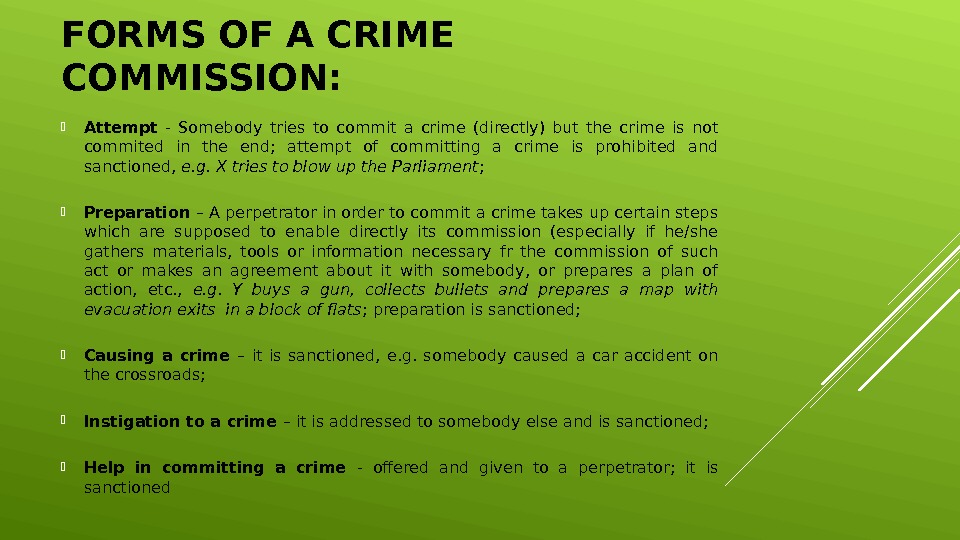
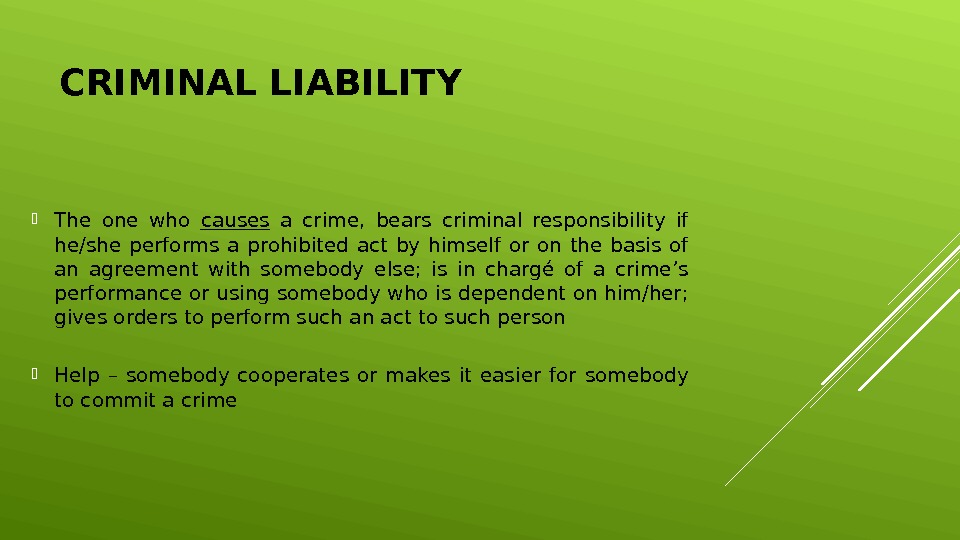
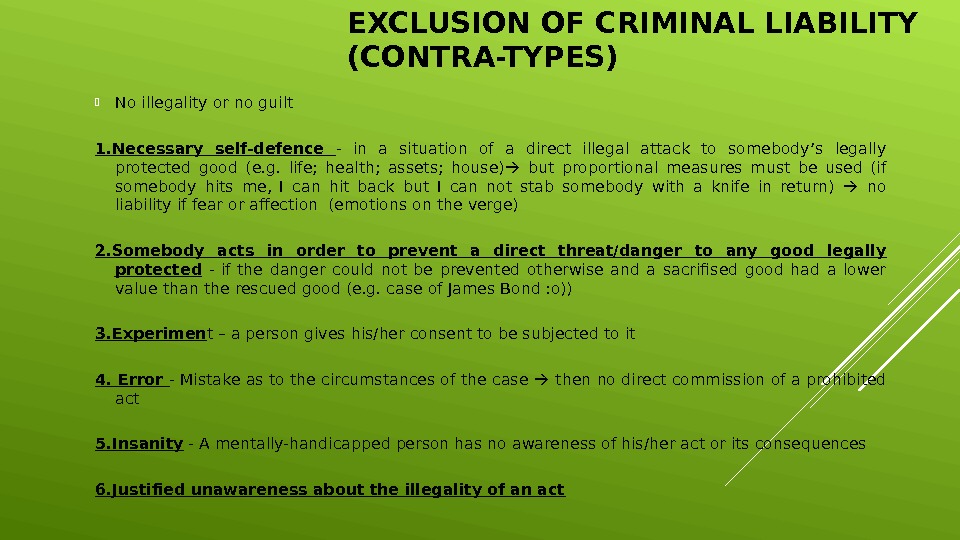
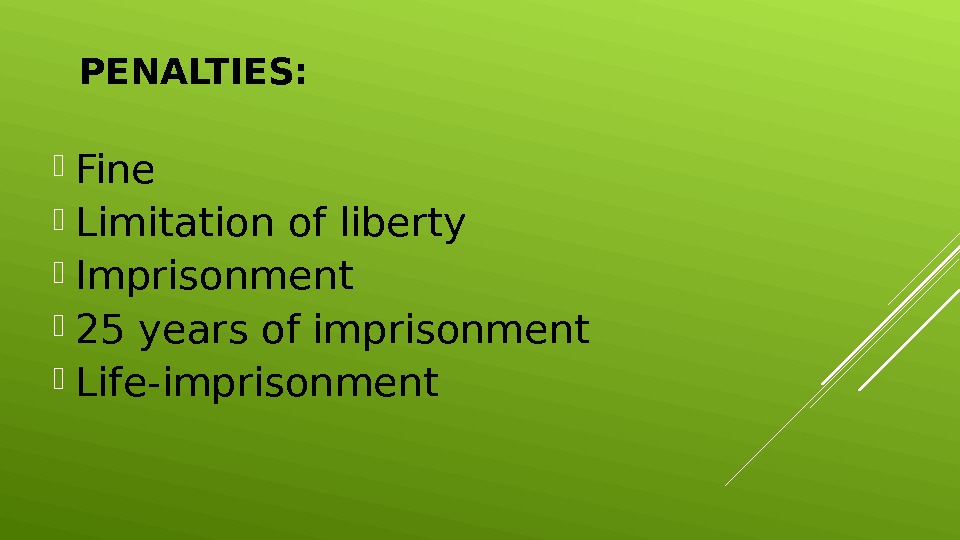
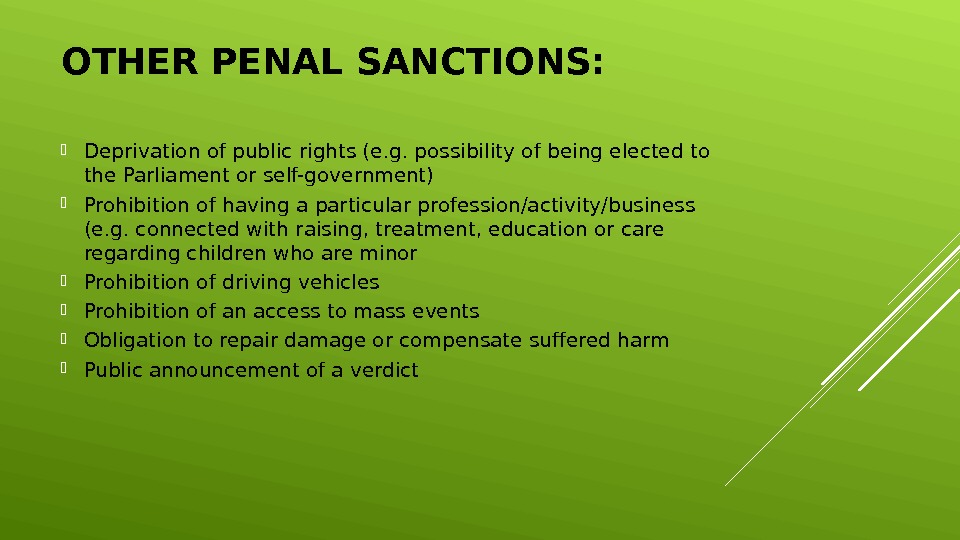
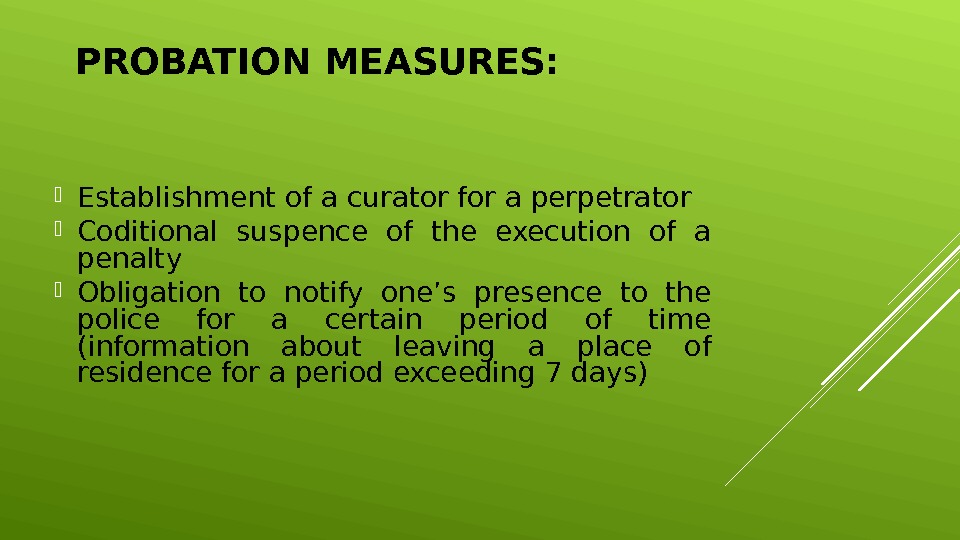
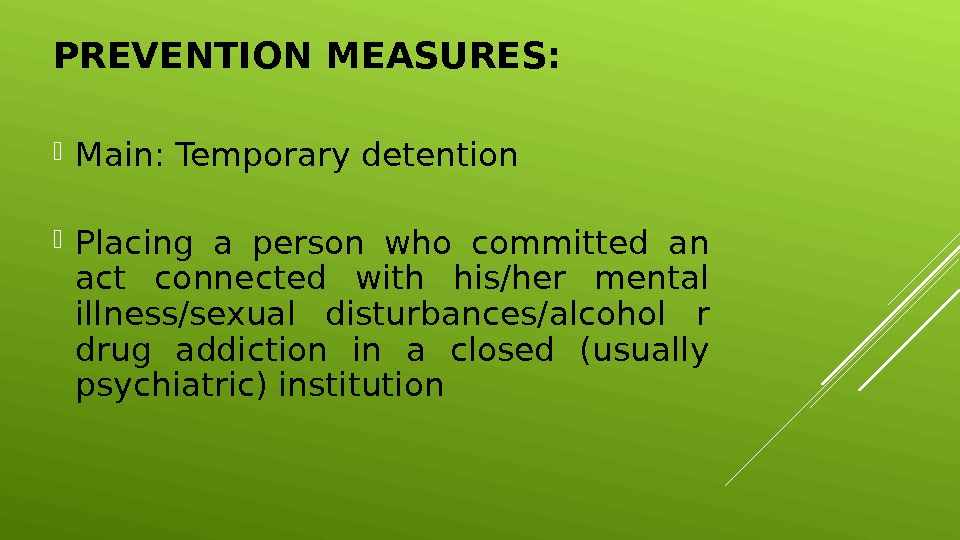
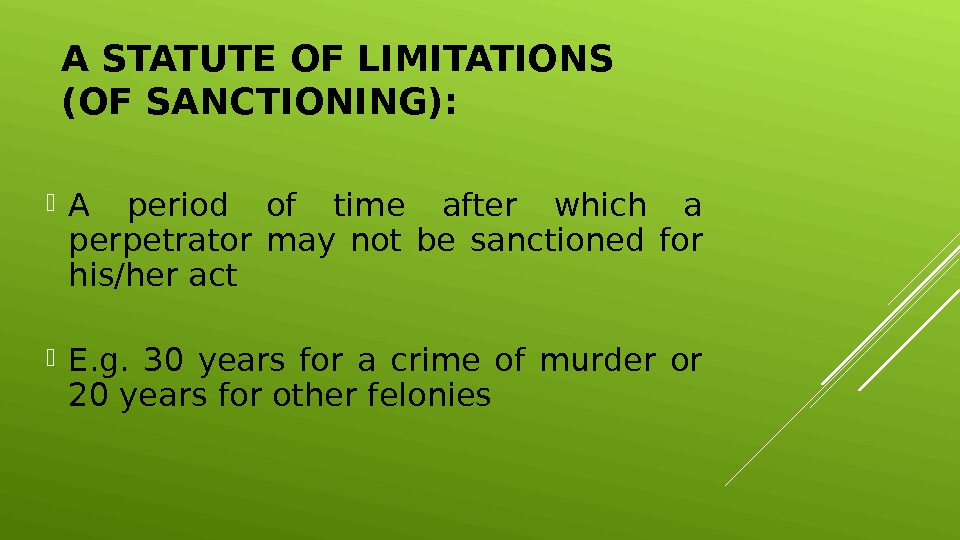
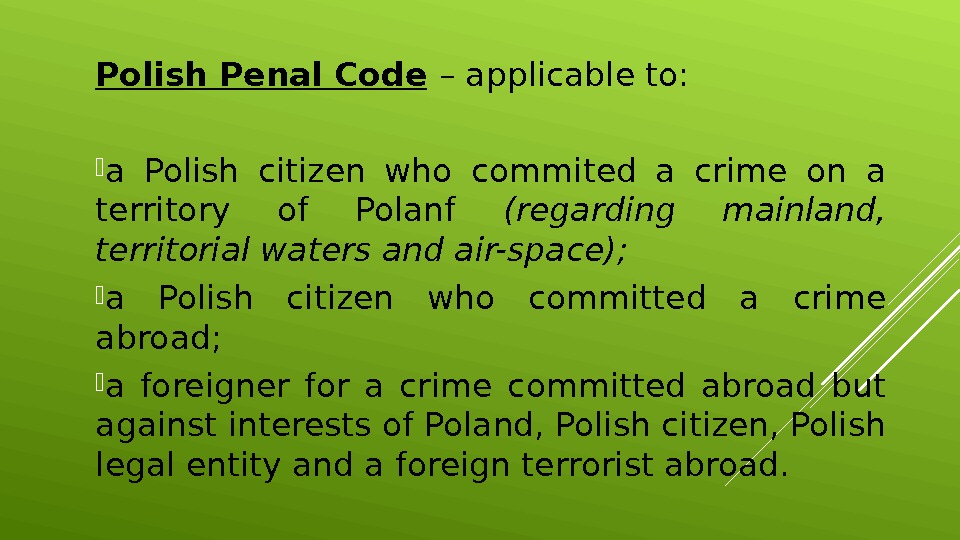
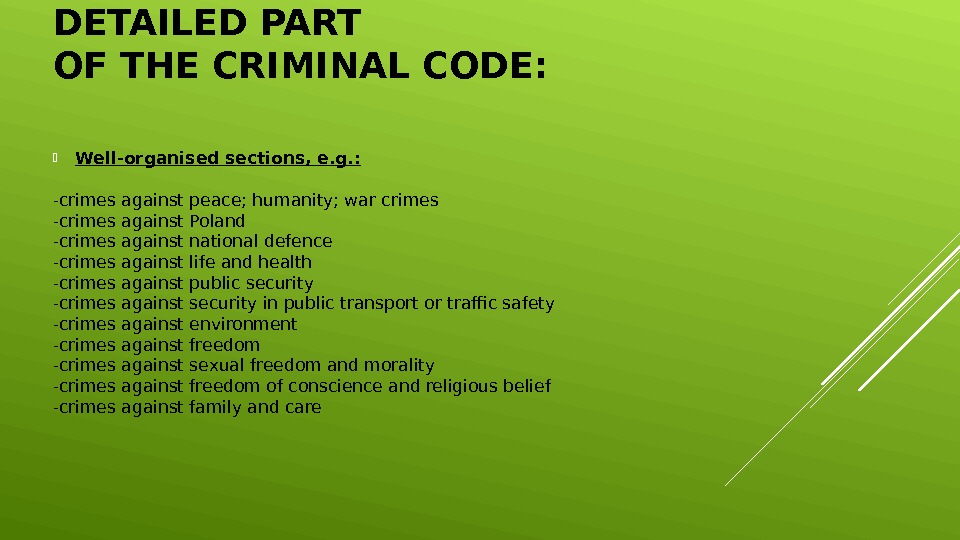
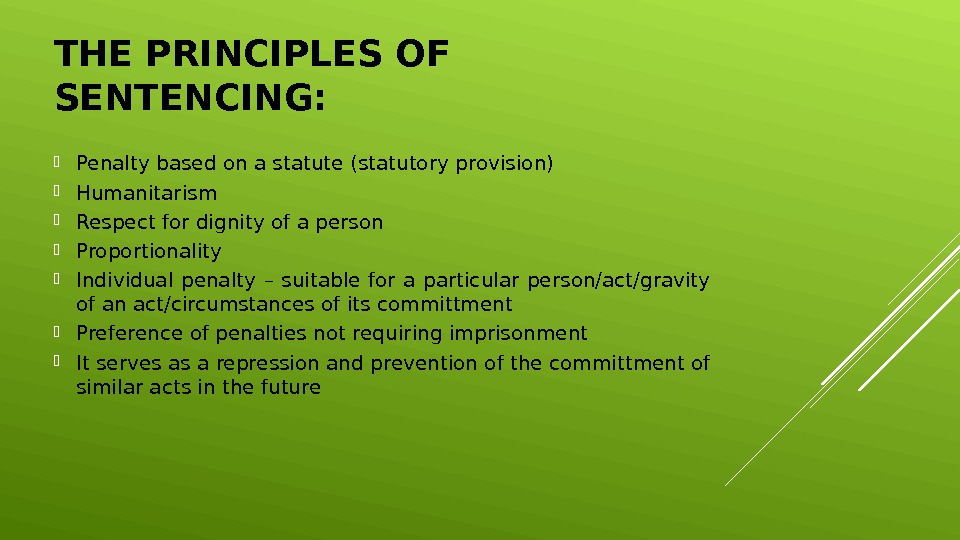
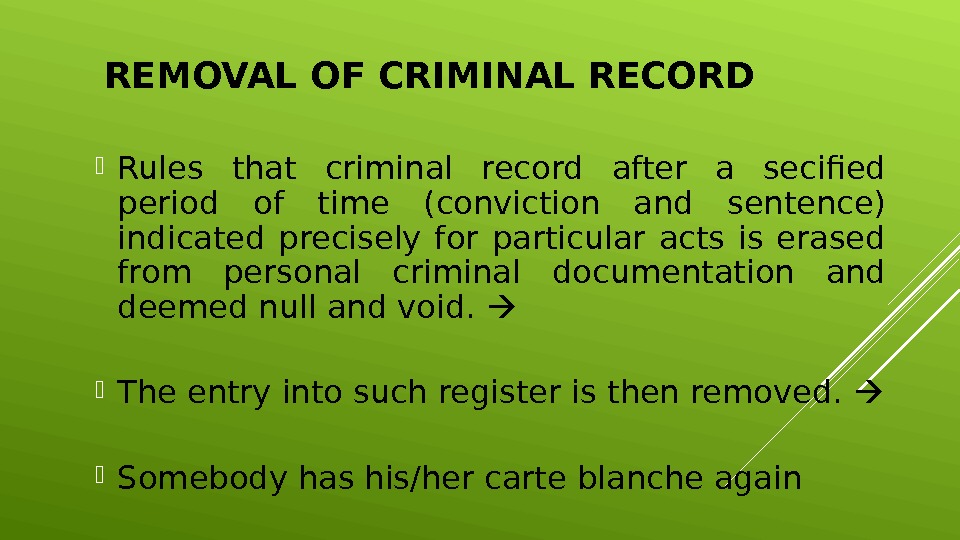
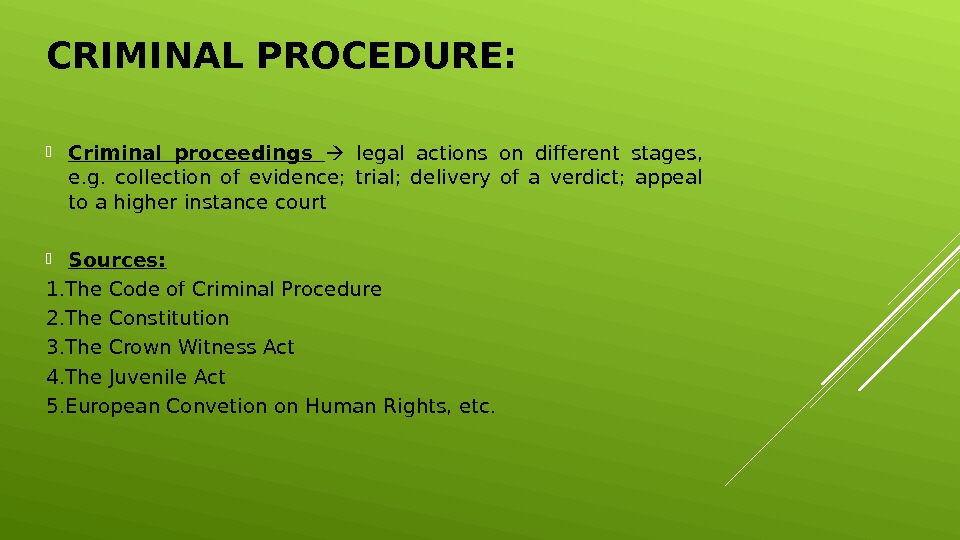
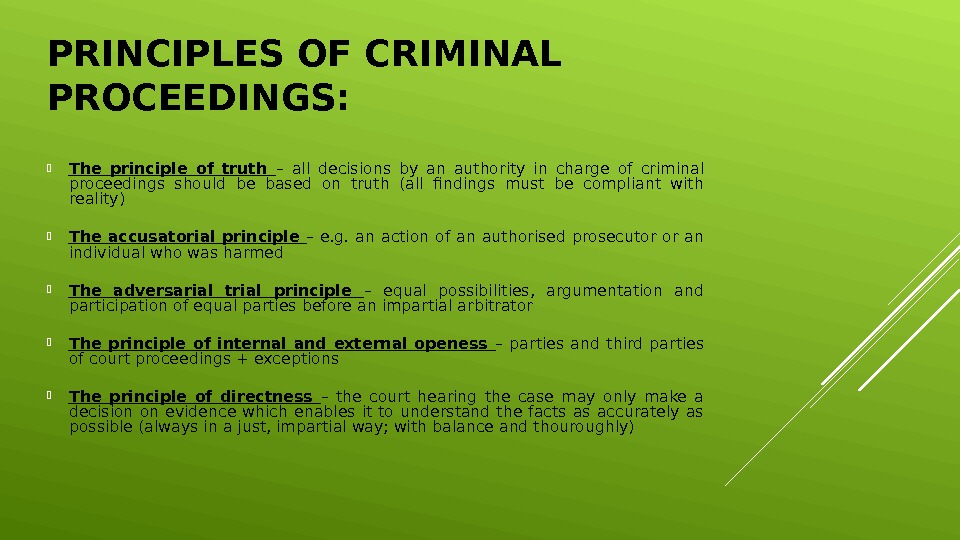
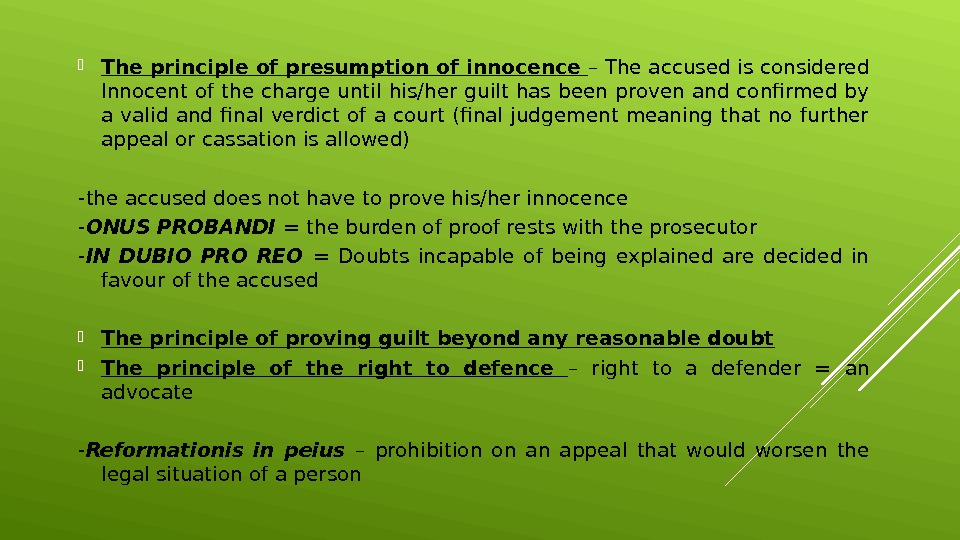
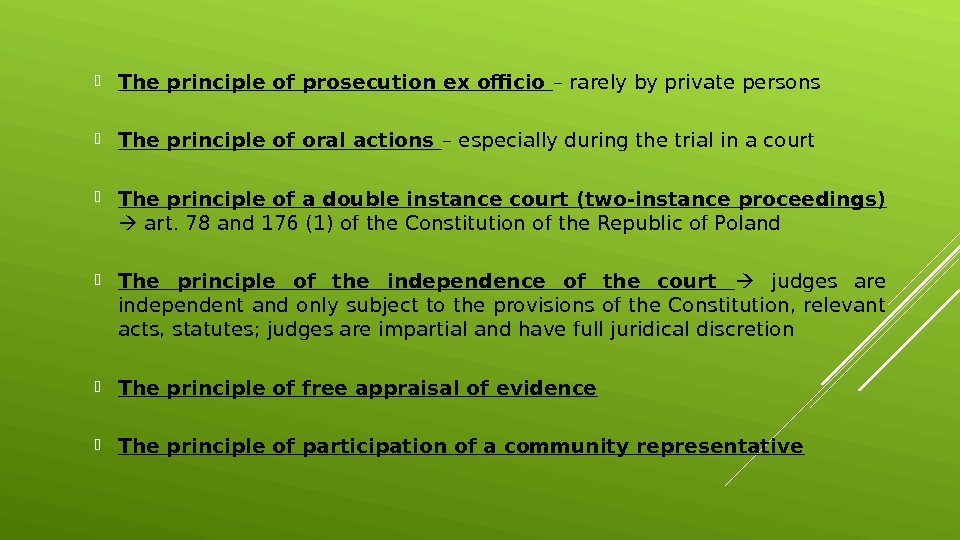
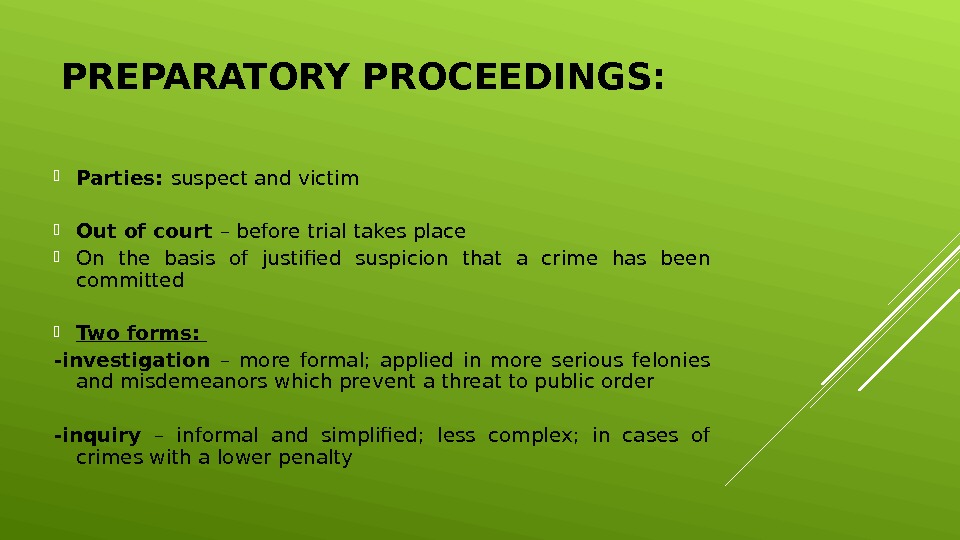
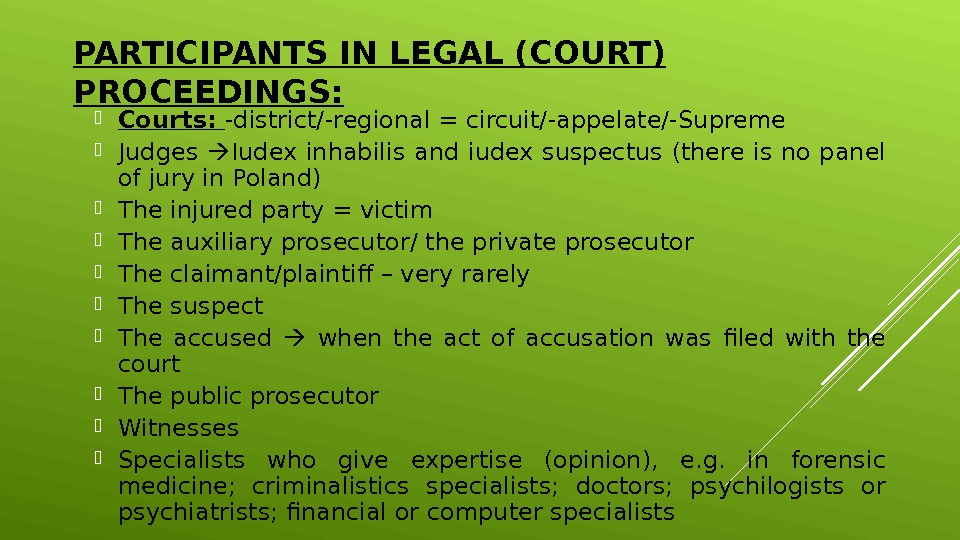
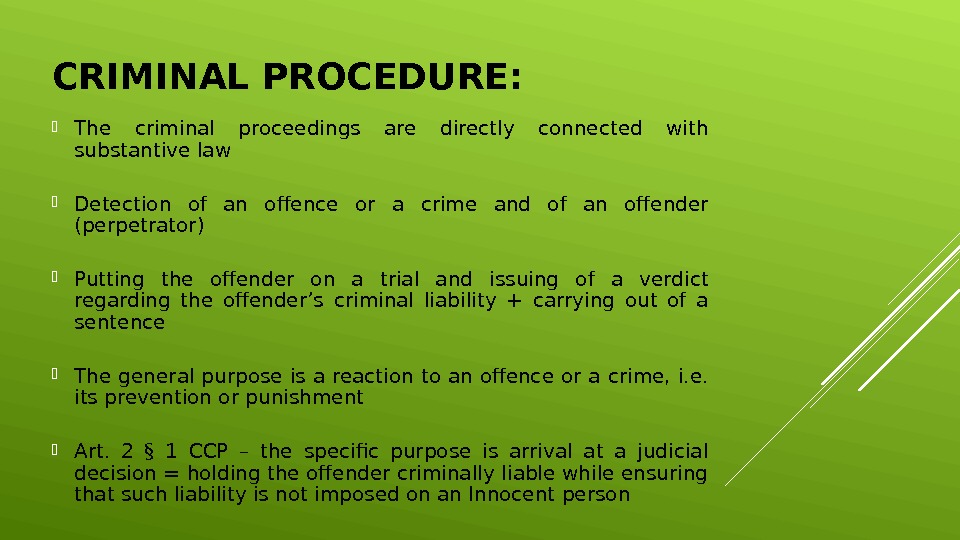
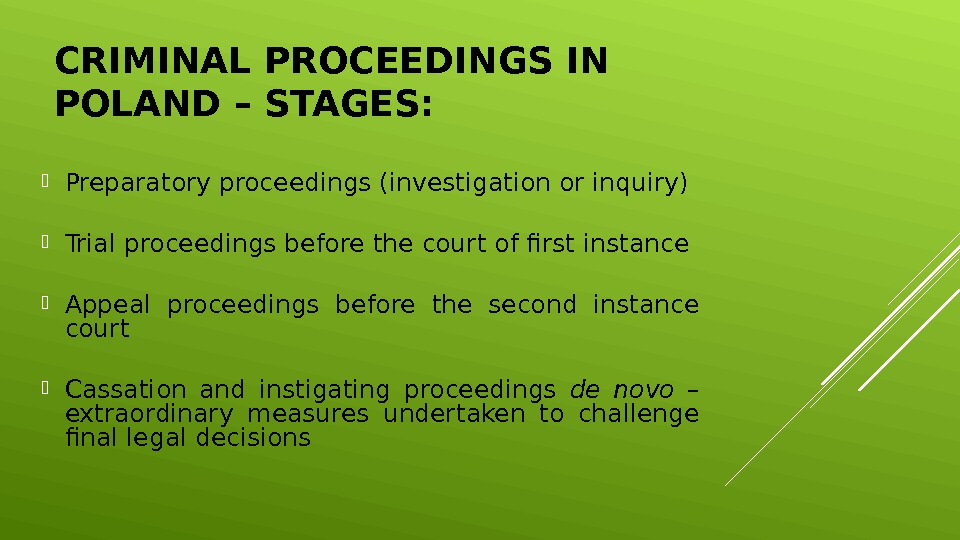
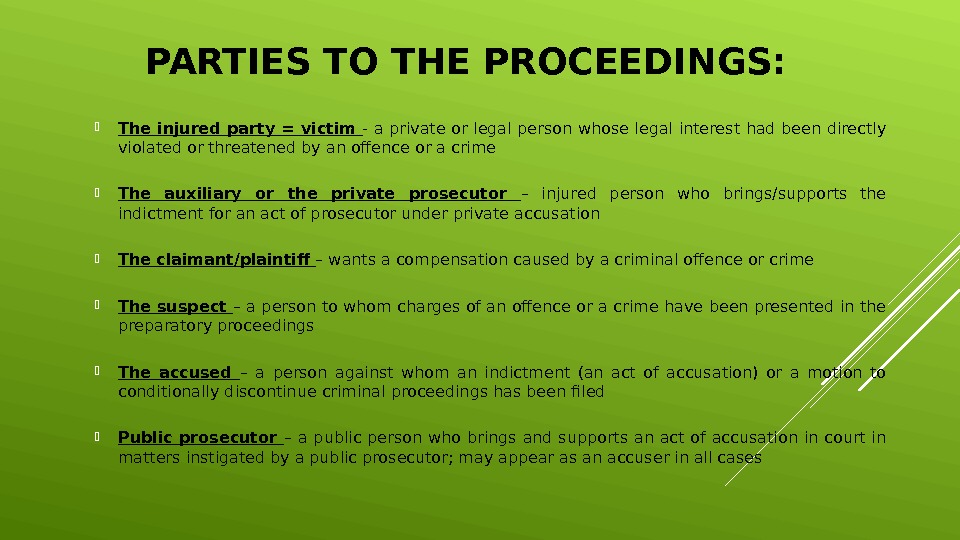
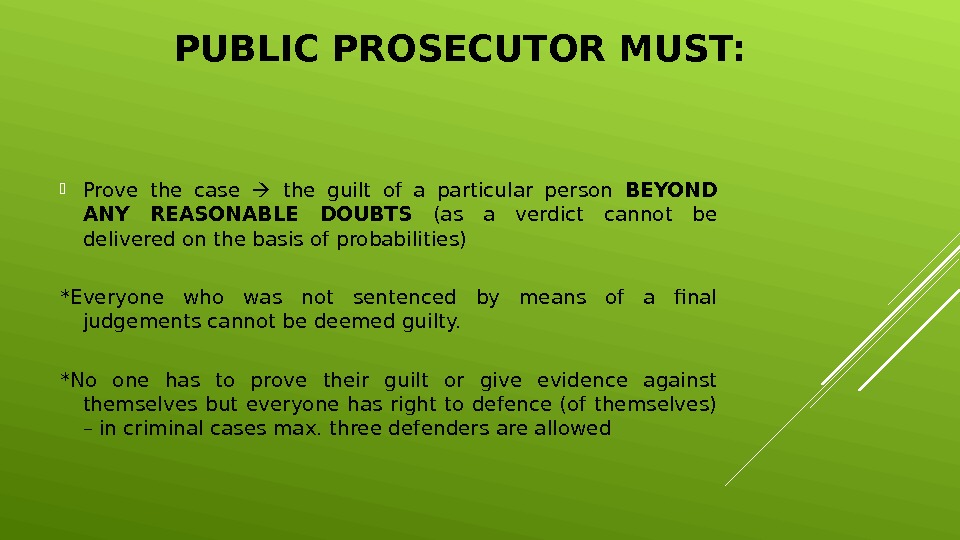

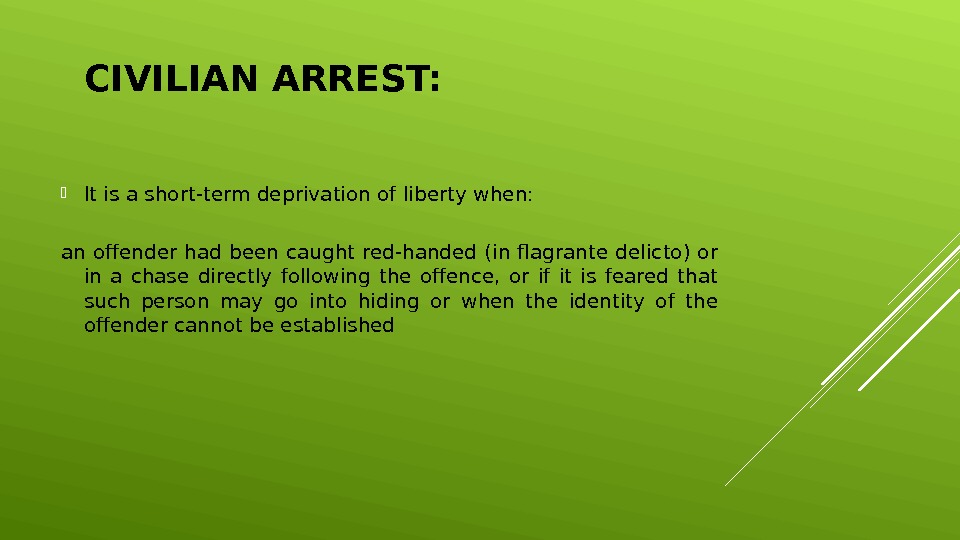
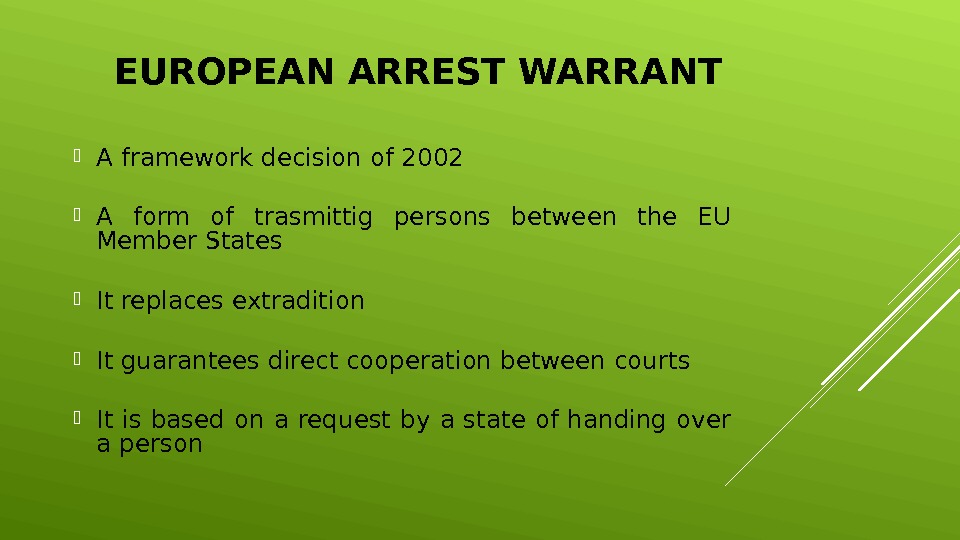
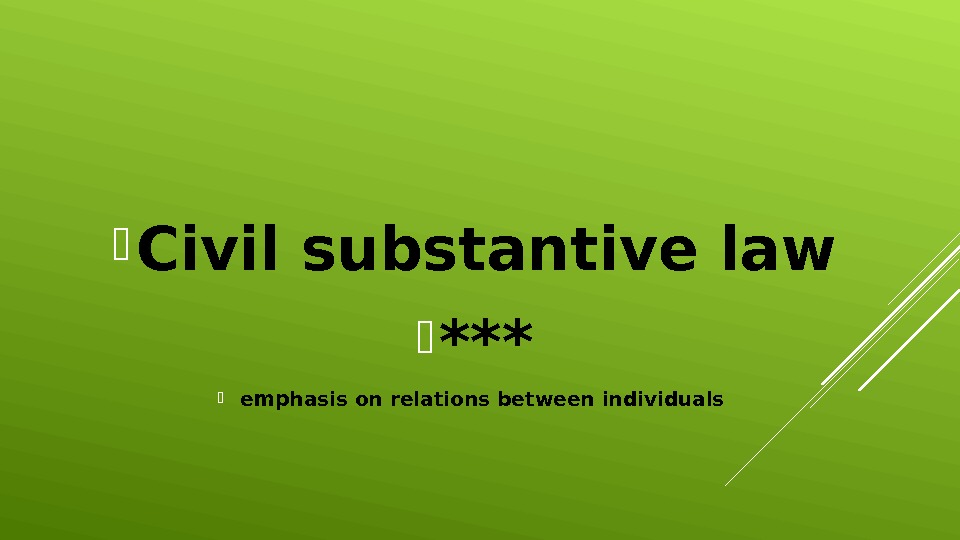
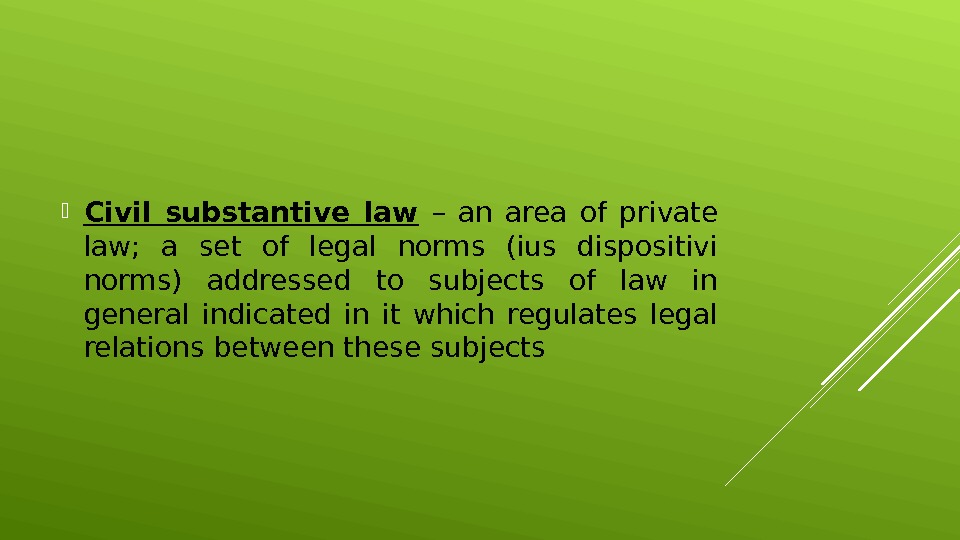
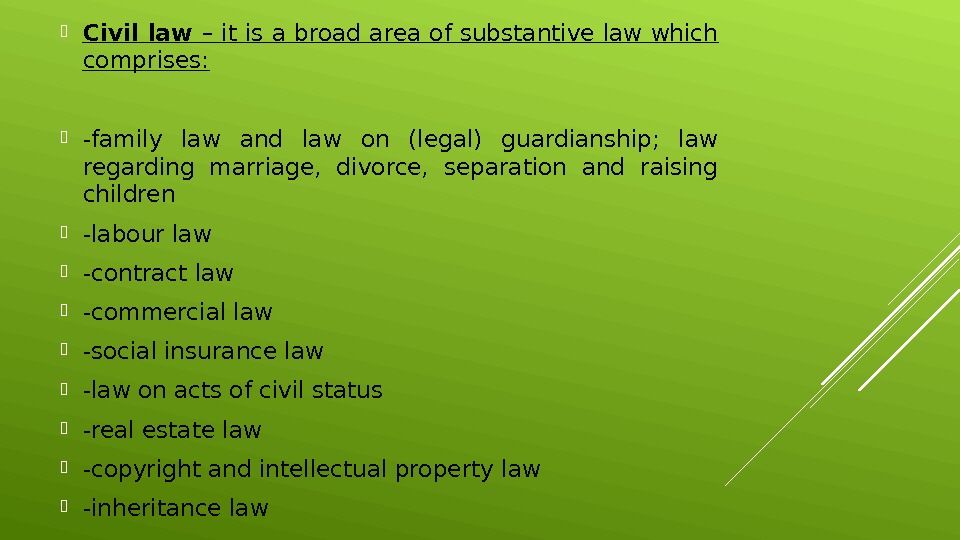
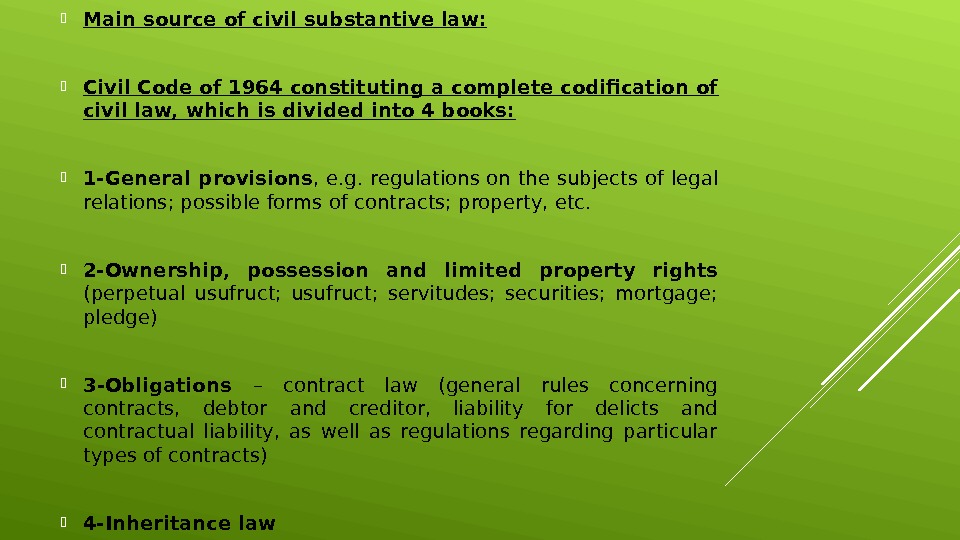
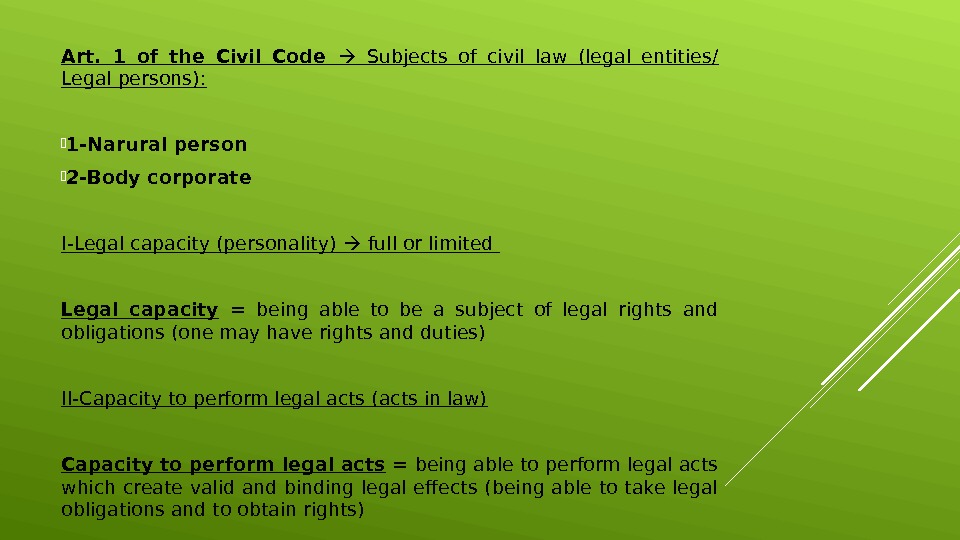
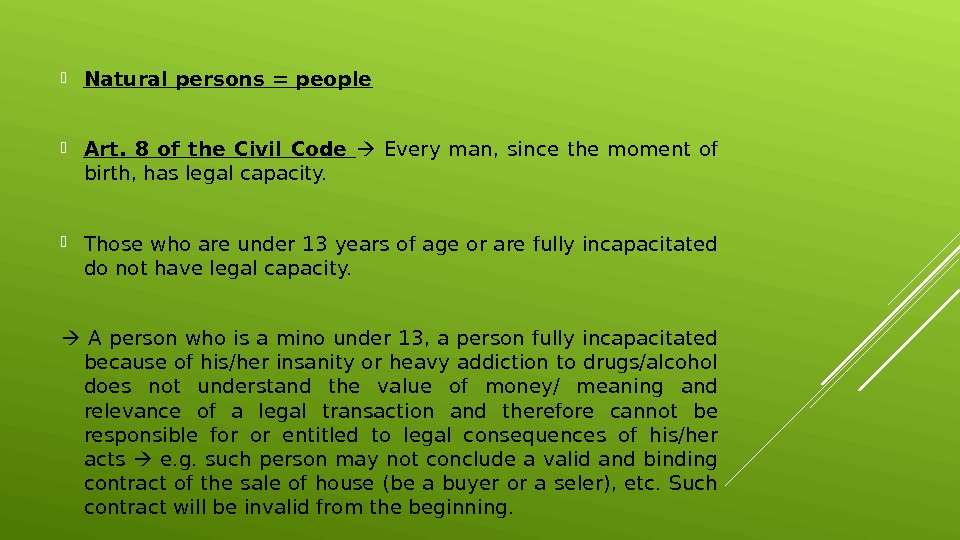
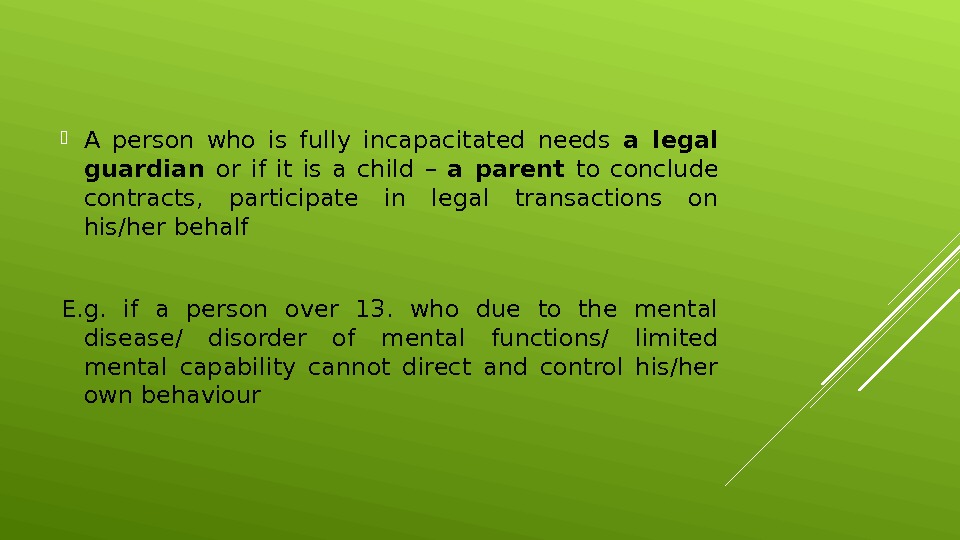
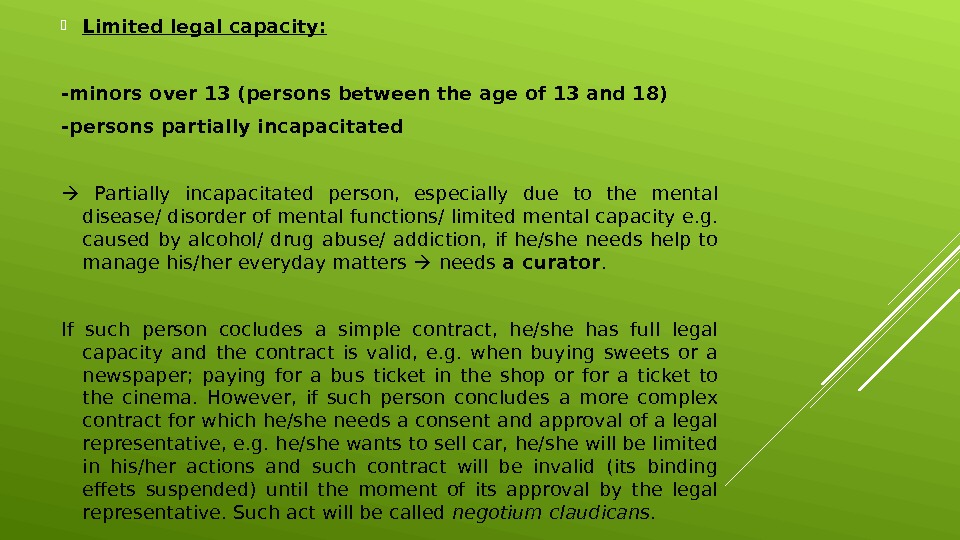
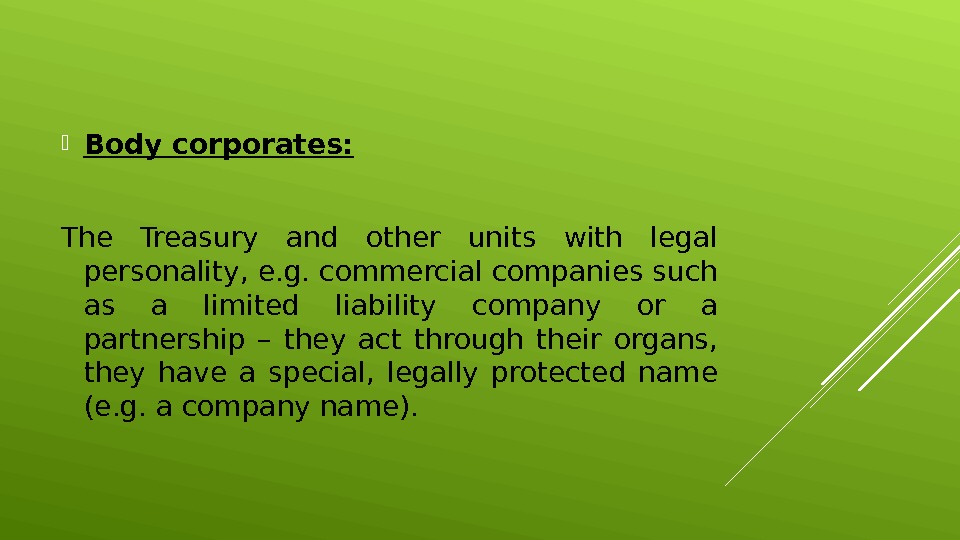
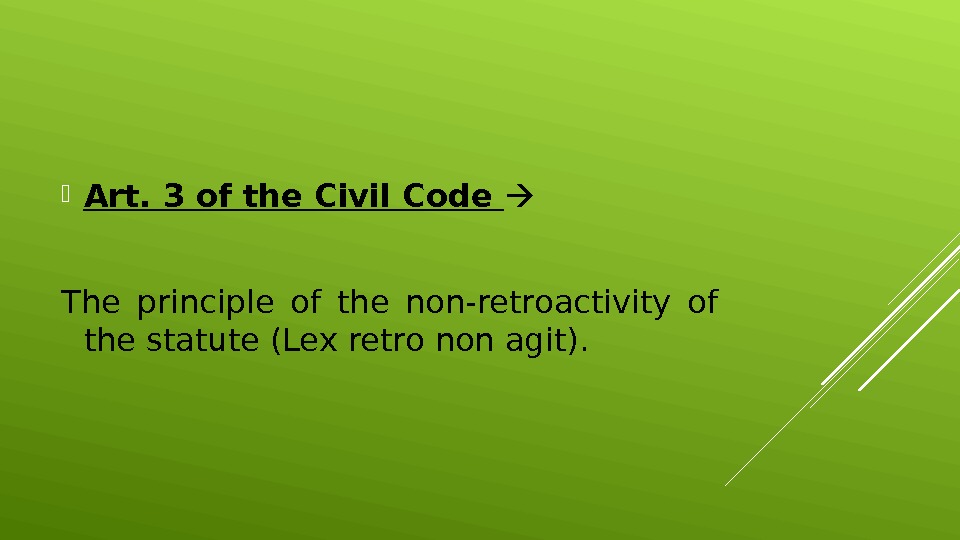
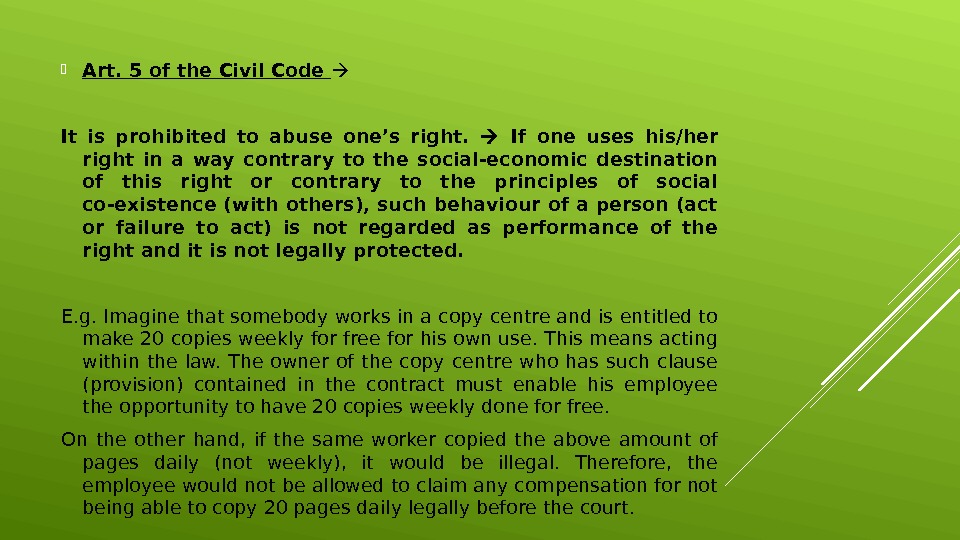
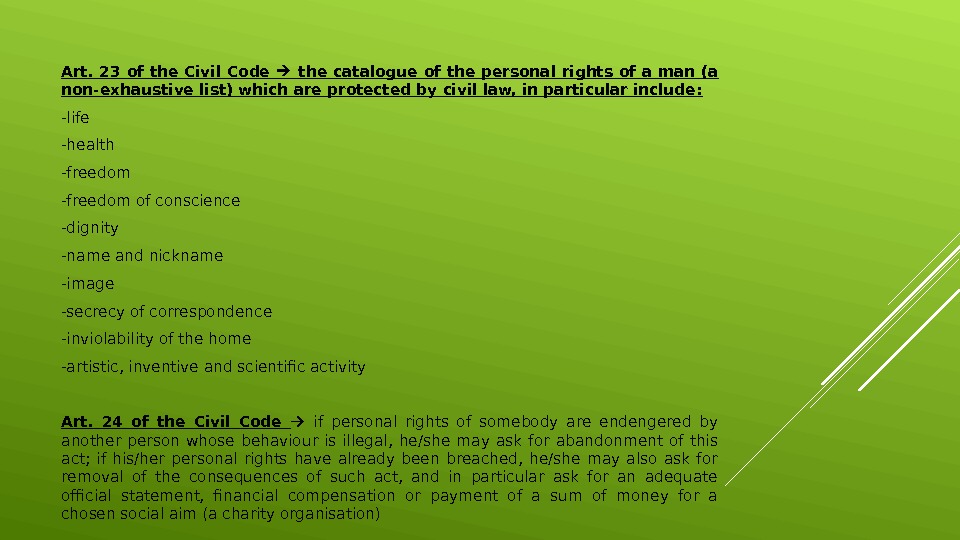
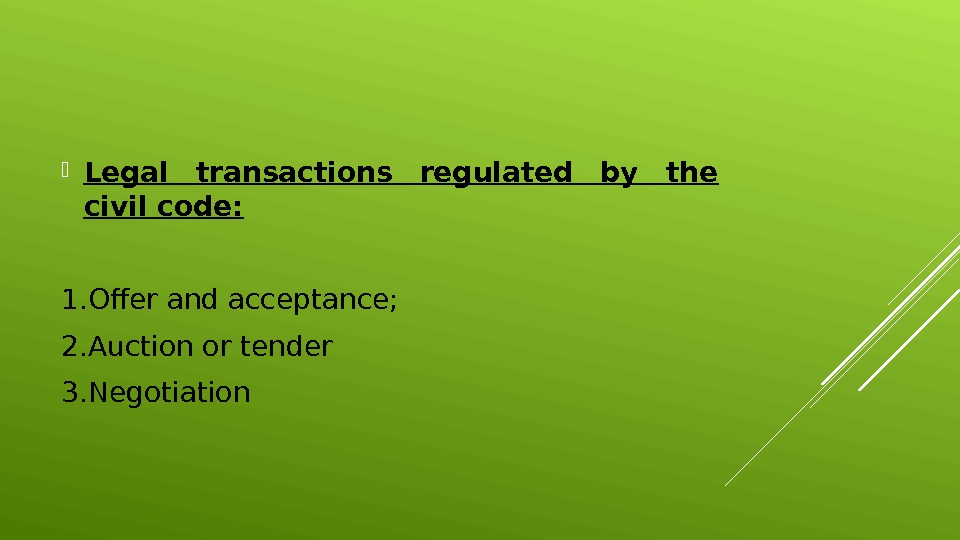
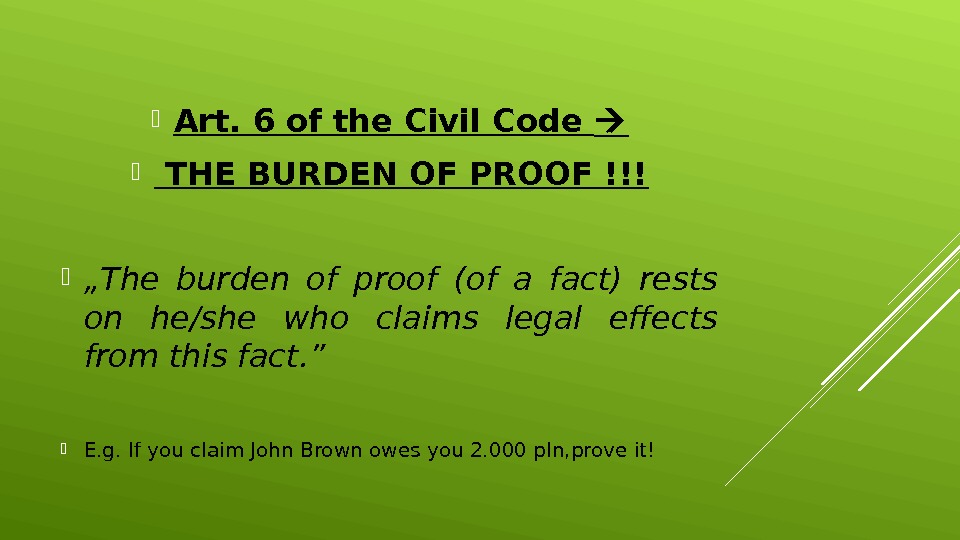

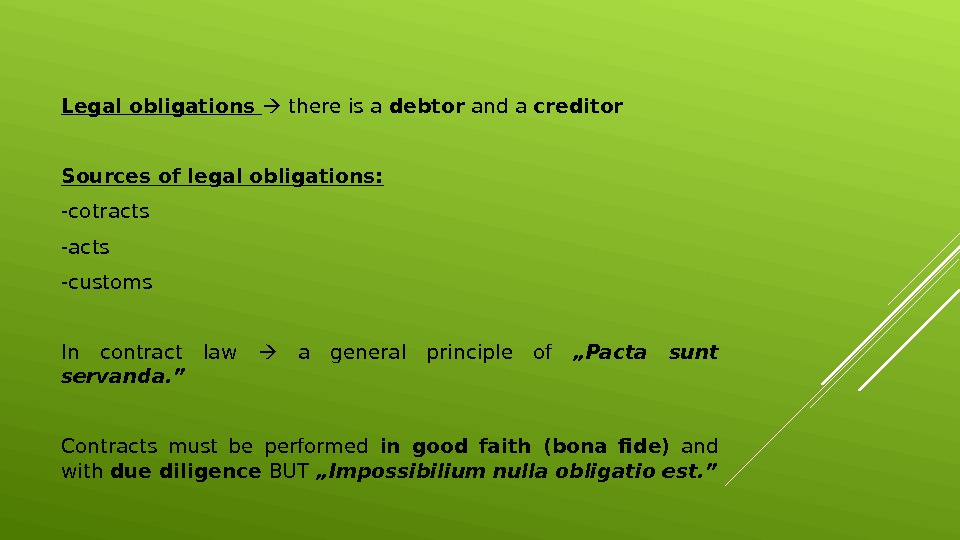
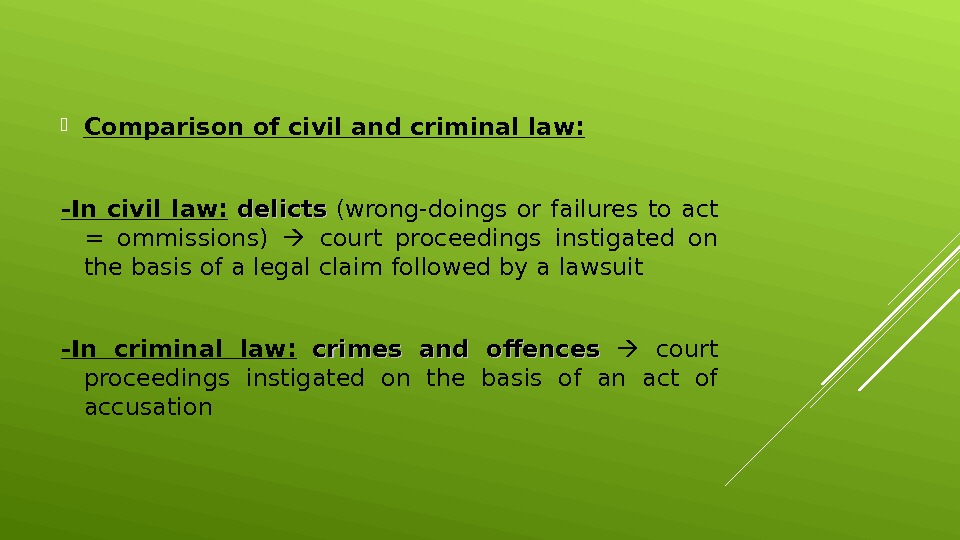
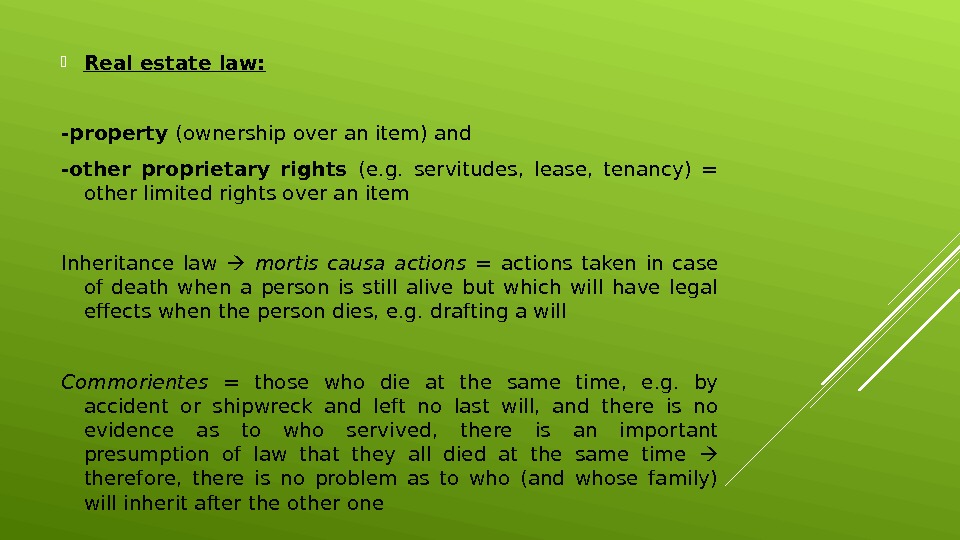
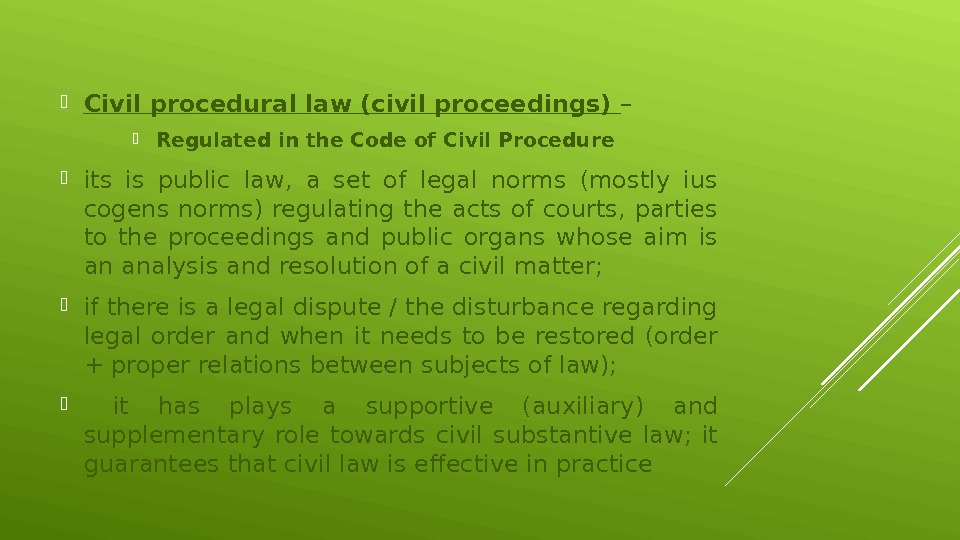
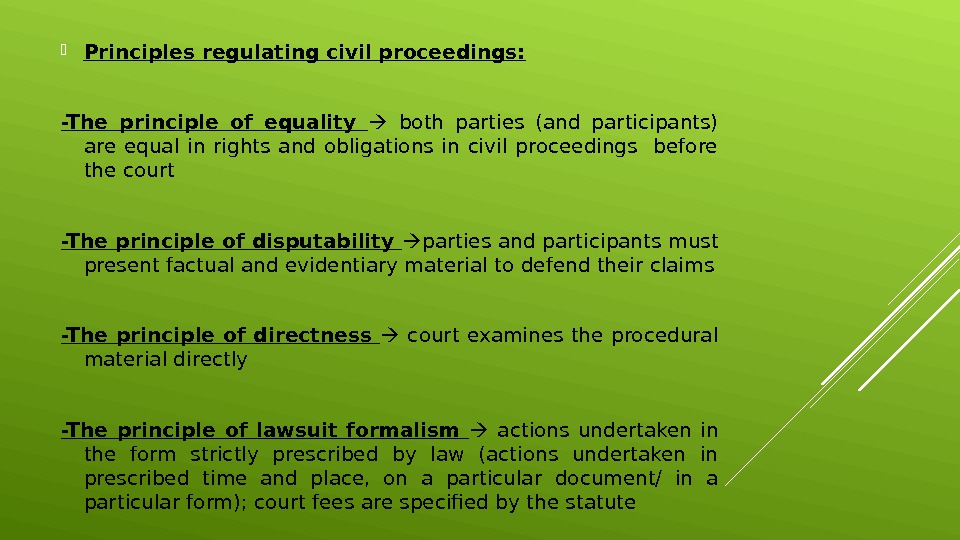
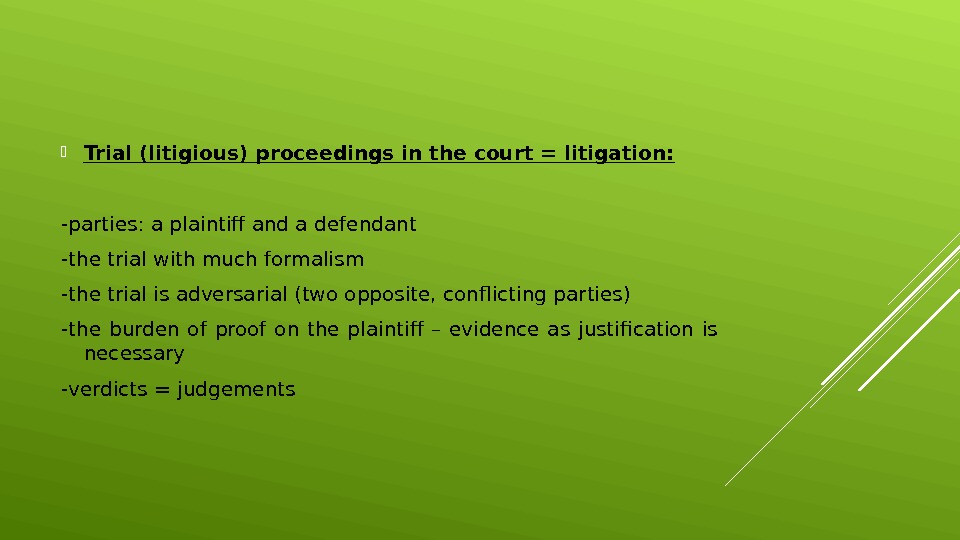
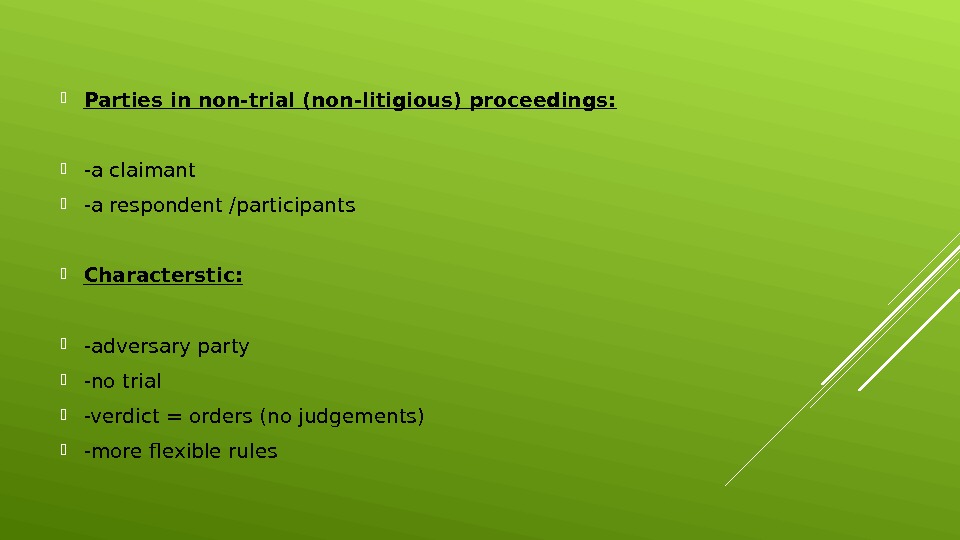
- Размер: 564.5 Кб
- Количество слайдов: 57
Описание презентации CRIMINAL LAW = PENAL LAW THE STRUCTURE по слайдам
 CRIMINAL LAW = PENAL LAW
CRIMINAL LAW = PENAL LAW

 THE STRUCTURE AND COMPOSITION OF A CRIMINAL CODE: It is divided into three parts: 1. The general part — it contains general provisions on criminal liberty for crimes and offences; the exclusion of liberty; definition of a crime and an offence; a list of categories of penalties; forms in which crimes may be committed; probation measures; recidivism; preventive measures, etc. 2. The detailed part – provisions concerning categories of crimes and penalties (sanctions) for such acts. 3. The military part – it regards liability of soldiers for military crimes
THE STRUCTURE AND COMPOSITION OF A CRIMINAL CODE: It is divided into three parts: 1. The general part — it contains general provisions on criminal liberty for crimes and offences; the exclusion of liberty; definition of a crime and an offence; a list of categories of penalties; forms in which crimes may be committed; probation measures; recidivism; preventive measures, etc. 2. The detailed part – provisions concerning categories of crimes and penalties (sanctions) for such acts. 3. The military part – it regards liability of soldiers for military crimes
 ART. 42 § 1 OF THE CONSTITUTION OF THE REPUBLIC OF POLAND: It requires criminal liability to be provided for by statutes „ Only a person who has committed an act prohibited by a statute in force at the moment of commission thereof, and which is subject to a penalty, shall be held criminally liable. This principle shall not prevent punishment of any act which, at the moment of its commission cnstituted an offence within the meaning of international law. ” The principle of „Nullum crimen, nulla poena sine lege. ” Penalties must be given with respect of the humanitarian principles, especially human dignity.
ART. 42 § 1 OF THE CONSTITUTION OF THE REPUBLIC OF POLAND: It requires criminal liability to be provided for by statutes „ Only a person who has committed an act prohibited by a statute in force at the moment of commission thereof, and which is subject to a penalty, shall be held criminally liable. This principle shall not prevent punishment of any act which, at the moment of its commission cnstituted an offence within the meaning of international law. ” The principle of „Nullum crimen, nulla poena sine lege. ” Penalties must be given with respect of the humanitarian principles, especially human dignity.
 ART. 1 § 1 OF THE CRIMINAL CODE: „ Criminal liability shall apply only to those who performer an act prohibited under pain of penalty by the law being in effect at the time of its commission. ” This means the time when a perpetrator acted or failed to act when he/she was supposed to.
ART. 1 § 1 OF THE CRIMINAL CODE: „ Criminal liability shall apply only to those who performer an act prohibited under pain of penalty by the law being in effect at the time of its commission. ” This means the time when a perpetrator acted or failed to act when he/she was supposed to.
 ART. 1 § 2 OF THE CRIMINAL CODE: We cannot treat as a crime such an act that is prohibited but which social harm is insignificant.
ART. 1 § 2 OF THE CRIMINAL CODE: We cannot treat as a crime such an act that is prohibited but which social harm is insignificant.
 ART. 1 § 3 OF THE CRIMINAL CODE: The perpetrator of a prohibited act does not commit a crime if at the time of its commission he/she is not guilty (there is no guilt).
ART. 1 § 3 OF THE CRIMINAL CODE: The perpetrator of a prohibited act does not commit a crime if at the time of its commission he/she is not guilty (there is no guilt).
 ART. 2 OF THE CRIMINAL CODE: The criminal liability for a crime with a result is involve only if a person who had a legal obligation to prevent such a result failed to prevent it. E. g. : a legal guardian of a child did not care enough to prevent him/her from a car crash when a child e. g. under 5 years old was let out alone with no one to watch him/her
ART. 2 OF THE CRIMINAL CODE: The criminal liability for a crime with a result is involve only if a person who had a legal obligation to prevent such a result failed to prevent it. E. g. : a legal guardian of a child did not care enough to prevent him/her from a car crash when a child e. g. under 5 years old was let out alone with no one to watch him/her
 CRIMES AND OFFENCES: Felony — crime; a prohibited act for which there can be a penalty of imprisonment of at least 3 years time or a more severe penalty Misdemeanor – crime; a prohibited act with a penalty of a fine over 30 daliy rate; restriction of liberty or imprisonment exceeding a month Felony can be committed only intentionally, misdemeanor can be committed also unintentionally if a statute says so.
CRIMES AND OFFENCES: Felony — crime; a prohibited act for which there can be a penalty of imprisonment of at least 3 years time or a more severe penalty Misdemeanor – crime; a prohibited act with a penalty of a fine over 30 daliy rate; restriction of liberty or imprisonment exceeding a month Felony can be committed only intentionally, misdemeanor can be committed also unintentionally if a statute says so.
 ACT COMMITTED INTENTIONALLY: A perpetrator has intention to commit a prohibited act (he/she wants to commit it) A perpetrator forsees a possibility of a commission of such an act and he/she agrees to it
ACT COMMITTED INTENTIONALLY: A perpetrator has intention to commit a prohibited act (he/she wants to commit it) A perpetrator forsees a possibility of a commission of such an act and he/she agrees to it
 FORMS OF A CRIME COMMISSION: Attempt — Somebody tries to commit a crime (directly) but the crime is not commited in the end; attempt of committing a crime is prohibited and sanctioned, e. g. X tries to blow up the Parliament ; Preparation – A perpetrator in order to commit a crime takes up certain steps which are supposed to enable directly its commission (especially if he/she gathers materials, tools or information necessary fr the commission of such act or makes an agreement about it with somebody, or prepares a plan of action, etc. , e. g. Y buys a gun, collects bullets and prepares a map with evacuation exits in a block of flats ; preparation is sanctioned; Causing a crime – it is sanctioned, e. g. somebody caused a car accident on the crossroads; Instigation to a crime – it is addressed to somebody else and is sanctioned; Help in committing a crime — offered and given to a perpetrator; it is sanctioned
FORMS OF A CRIME COMMISSION: Attempt — Somebody tries to commit a crime (directly) but the crime is not commited in the end; attempt of committing a crime is prohibited and sanctioned, e. g. X tries to blow up the Parliament ; Preparation – A perpetrator in order to commit a crime takes up certain steps which are supposed to enable directly its commission (especially if he/she gathers materials, tools or information necessary fr the commission of such act or makes an agreement about it with somebody, or prepares a plan of action, etc. , e. g. Y buys a gun, collects bullets and prepares a map with evacuation exits in a block of flats ; preparation is sanctioned; Causing a crime – it is sanctioned, e. g. somebody caused a car accident on the crossroads; Instigation to a crime – it is addressed to somebody else and is sanctioned; Help in committing a crime — offered and given to a perpetrator; it is sanctioned
 CRIMINAL LIABILITY The one who causes a crime, bears criminal responsibility if he/she performs a prohibited act by himself or on the basis of an agreement with somebody else; is in chargé of a crime’s performance or using somebody who is dependent on him/her; gives orders to perform such an act to such person Help – somebody cooperates or makes it easier for somebody to commit a crime
CRIMINAL LIABILITY The one who causes a crime, bears criminal responsibility if he/she performs a prohibited act by himself or on the basis of an agreement with somebody else; is in chargé of a crime’s performance or using somebody who is dependent on him/her; gives orders to perform such an act to such person Help – somebody cooperates or makes it easier for somebody to commit a crime
 EXCLUSION OF CRIMINAL LIABILITY (CONTRA-TYPES) No illegality or no guilt 1. Necessary self-defence — in a situation of a direct illegal attack to somebody’s legally protected good (e. g. life; health; assets; house) but proportional measures must be used (if somebody hits me, I can hit back but I can not stab somebody with a knife in return) no liability if fear or affection (emotions on the verge) 2. Somebody acts in order to prevent a direct threat/danger to any good legally protected — if the danger could not be prevented otherwise and a sacrifised good had a lower value than the rescued good (e. g. case of James Bond : o)) 3. Experimen t – a person gives his/her consent to be subjected to it 4. Error — Mistake as to the circumstances of the case then no direct commission of a prohibited act 5. Insanity — A mentally-handicapped person has no awareness of his/her act or its consequences 6. Justified unawareness about the illegality of an act
EXCLUSION OF CRIMINAL LIABILITY (CONTRA-TYPES) No illegality or no guilt 1. Necessary self-defence — in a situation of a direct illegal attack to somebody’s legally protected good (e. g. life; health; assets; house) but proportional measures must be used (if somebody hits me, I can hit back but I can not stab somebody with a knife in return) no liability if fear or affection (emotions on the verge) 2. Somebody acts in order to prevent a direct threat/danger to any good legally protected — if the danger could not be prevented otherwise and a sacrifised good had a lower value than the rescued good (e. g. case of James Bond : o)) 3. Experimen t – a person gives his/her consent to be subjected to it 4. Error — Mistake as to the circumstances of the case then no direct commission of a prohibited act 5. Insanity — A mentally-handicapped person has no awareness of his/her act or its consequences 6. Justified unawareness about the illegality of an act
 PENALTIES: Fine Limitation of liberty Imprisonment 25 years of imprisonment Life-imprisonment
PENALTIES: Fine Limitation of liberty Imprisonment 25 years of imprisonment Life-imprisonment
 OTHER PENAL SANCTIONS: Deprivation of public rights (e. g. possibility of being elected to the Parliament or self-government) Prohibition of having a particular profession/activity/business (e. g. connected with raising, treatment, education or care regarding children who are minor Prohibition of driving vehicles Prohibition of an access to mass events Obligation to repair damage or compensate suffered harm Public announcement of a verdict
OTHER PENAL SANCTIONS: Deprivation of public rights (e. g. possibility of being elected to the Parliament or self-government) Prohibition of having a particular profession/activity/business (e. g. connected with raising, treatment, education or care regarding children who are minor Prohibition of driving vehicles Prohibition of an access to mass events Obligation to repair damage or compensate suffered harm Public announcement of a verdict
 PROBATION MEASURES: Establishment of a curator for a perpetrator Coditional suspence of the execution of a penalty Obligation to notify one’s presence to the police for a certain period of time (information about leaving a place of residence for a period exceeding 7 days)
PROBATION MEASURES: Establishment of a curator for a perpetrator Coditional suspence of the execution of a penalty Obligation to notify one’s presence to the police for a certain period of time (information about leaving a place of residence for a period exceeding 7 days)
 PREVENTION MEASURES: Main: Temporary detention Placing a person who committed an act connected with his/her mental illness/sexual disturbances/alcohol r drug addiction in a closed (usually psychiatric) institution
PREVENTION MEASURES: Main: Temporary detention Placing a person who committed an act connected with his/her mental illness/sexual disturbances/alcohol r drug addiction in a closed (usually psychiatric) institution
 A STATUTE OF LIMITATIONS (OF SANCTIONING): A period of time after which a perpetrator may not be sanctioned for his/her act E. g. 30 years for a crime of murder or 20 years for other felonies
A STATUTE OF LIMITATIONS (OF SANCTIONING): A period of time after which a perpetrator may not be sanctioned for his/her act E. g. 30 years for a crime of murder or 20 years for other felonies
 Polish Penal Code – applicable to: a Polish citizen who commited a crime on a territory of Polanf (regarding mainland, territorial waters and air-space); a Polish citizen who committed a crime abroad; a foreigner for a crime committed abroad but against interests of Poland, Polish citizen, Polish legal entity and a foreign terrorist abroad.
Polish Penal Code – applicable to: a Polish citizen who commited a crime on a territory of Polanf (regarding mainland, territorial waters and air-space); a Polish citizen who committed a crime abroad; a foreigner for a crime committed abroad but against interests of Poland, Polish citizen, Polish legal entity and a foreign terrorist abroad.
 DETAILED PART OF THE CRIMINAL CODE: Well-organised sections, e. g. : -crimes against peace; humanity; war crimes -crimes against Poland -crimes against national defence -crimes against life and health -crimes against public security -crimes against security in public transport or traffic safety -crimes against environment -crimes against freedom -crimes against sexual freedom and morality -crimes against freedom of conscience and religious belief -crimes against family and care
DETAILED PART OF THE CRIMINAL CODE: Well-organised sections, e. g. : -crimes against peace; humanity; war crimes -crimes against Poland -crimes against national defence -crimes against life and health -crimes against public security -crimes against security in public transport or traffic safety -crimes against environment -crimes against freedom -crimes against sexual freedom and morality -crimes against freedom of conscience and religious belief -crimes against family and care
 THE PRINCIPLES OF SENTENCING: Penalty based on a statute (statutory provision) Humanitarism Respect for dignity of a person Proportionality Individual penalty – suitable for a particular person/act/gravity of an act/circumstances of its committment Preference of penalties not requiring imprisonment It serves as a repression and prevention of the committment of similar acts in the future
THE PRINCIPLES OF SENTENCING: Penalty based on a statute (statutory provision) Humanitarism Respect for dignity of a person Proportionality Individual penalty – suitable for a particular person/act/gravity of an act/circumstances of its committment Preference of penalties not requiring imprisonment It serves as a repression and prevention of the committment of similar acts in the future
 REMOVAL OF CRIMINAL RECORD Rules that criminal record after a secified period of time (conviction and sentence) indicated precisely for particular acts is erased from personal criminal documentation and deemed null and void. The entry into such register is then removed. Somebody has his/her carte blanche again
REMOVAL OF CRIMINAL RECORD Rules that criminal record after a secified period of time (conviction and sentence) indicated precisely for particular acts is erased from personal criminal documentation and deemed null and void. The entry into such register is then removed. Somebody has his/her carte blanche again
 CRIMINAL PROCEDURE: Criminal proceedings legal actions on different stages, e. g. collection of evidence; trial; delivery of a verdict; appeal to a higher instance court Sources: 1. The Code of Criminal Procedure 2. The Constitution 3. The Crown Witness Act 4. The Juvenile Act 5. European Convetion on Human Rights, etc.
CRIMINAL PROCEDURE: Criminal proceedings legal actions on different stages, e. g. collection of evidence; trial; delivery of a verdict; appeal to a higher instance court Sources: 1. The Code of Criminal Procedure 2. The Constitution 3. The Crown Witness Act 4. The Juvenile Act 5. European Convetion on Human Rights, etc.
 PRINCIPLES OF CRIMINAL PROCEEDINGS: The principle of truth – all decisions by an authority in charge of criminal proceedings should be based on truth (all findings must be compliant with reality) The accusatorial principle – e. g. an action of an authorised prosecutor or an individual who was harmed The adversarial trial principle – equal possibilities, argumentation and participation of equal parties before an impartial arbitrator The principle of internal and external openess – parties and third parties of court proceedings + exceptions The principle of directness – the court hearing the case may only make a decision on evidence which enables it to understand the facts as accurately as possible (always in a just, impartial way; with balance and thouroughly)
PRINCIPLES OF CRIMINAL PROCEEDINGS: The principle of truth – all decisions by an authority in charge of criminal proceedings should be based on truth (all findings must be compliant with reality) The accusatorial principle – e. g. an action of an authorised prosecutor or an individual who was harmed The adversarial trial principle – equal possibilities, argumentation and participation of equal parties before an impartial arbitrator The principle of internal and external openess – parties and third parties of court proceedings + exceptions The principle of directness – the court hearing the case may only make a decision on evidence which enables it to understand the facts as accurately as possible (always in a just, impartial way; with balance and thouroughly)
 The principle of presumption of innocence – The accused is considered Innocent of the charge until his/her guilt has been proven and confirmed by a valid and final verdict of a court (final judgement meaning that no further appeal or cassation is allowed) -the accused does not have to prove his/her innocence — ONUS PROBANDI = the burden of proof rests with the prosecutor — IN DUBIO PRO REO = Doubts incapable of being explained are decided in favour of the accused The principle of proving guilt beyond any reasonable doubt The principle of the right to defence – right to a defender = an advocate — Reformationis in peius – prohibition on an appeal that would worsen the legal situation of a person
The principle of presumption of innocence – The accused is considered Innocent of the charge until his/her guilt has been proven and confirmed by a valid and final verdict of a court (final judgement meaning that no further appeal or cassation is allowed) -the accused does not have to prove his/her innocence — ONUS PROBANDI = the burden of proof rests with the prosecutor — IN DUBIO PRO REO = Doubts incapable of being explained are decided in favour of the accused The principle of proving guilt beyond any reasonable doubt The principle of the right to defence – right to a defender = an advocate — Reformationis in peius – prohibition on an appeal that would worsen the legal situation of a person
 The principle of prosecution ex officio – rarely by private persons The principle of oral actions – especially during the trial in a court The principle of a double instance court (two-instance proceedings) art. 78 and 176 (1) of the Constitution of the Republic of Poland The principle of the independence of the court judges are independent and only subject to the provisions of the Constitution, relevant acts, statutes; judges are impartial and have full juridical discretion The principle of free appraisal of evidence The principle of participation of a community representative
The principle of prosecution ex officio – rarely by private persons The principle of oral actions – especially during the trial in a court The principle of a double instance court (two-instance proceedings) art. 78 and 176 (1) of the Constitution of the Republic of Poland The principle of the independence of the court judges are independent and only subject to the provisions of the Constitution, relevant acts, statutes; judges are impartial and have full juridical discretion The principle of free appraisal of evidence The principle of participation of a community representative
 PREPARATORY PROCEEDINGS: Parties: suspect and victim Out of court – before trial takes place On the basis of justified suspicion that a crime has been committed Two forms: -investigation – more formal; applied in more serious felonies and misdemeanors which prevent a threat to public order -inquiry – informal and simplified; less complex; in cases of crimes with a lower penalty
PREPARATORY PROCEEDINGS: Parties: suspect and victim Out of court – before trial takes place On the basis of justified suspicion that a crime has been committed Two forms: -investigation – more formal; applied in more serious felonies and misdemeanors which prevent a threat to public order -inquiry – informal and simplified; less complex; in cases of crimes with a lower penalty
 PARTICIPANTS IN LEGAL (COURT) PROCEEDINGS: Courts: -district/-regional = circuit/-appelate/-Supreme Judges Iudex inhabilis and iudex suspectus (there is no panel of jury in Poland) The injured party = victim The auxiliary prosecutor/ the private prosecutor The claimant/plaintiff – very rarely The suspect The accused when the act of accusation was filed with the court The public prosecutor Witnesses Specialists who give expertise (opinion), e. g. in forensic medicine; criminalistics specialists; doctors; psychilogists or psychiatrists; financial or computer specialists
PARTICIPANTS IN LEGAL (COURT) PROCEEDINGS: Courts: -district/-regional = circuit/-appelate/-Supreme Judges Iudex inhabilis and iudex suspectus (there is no panel of jury in Poland) The injured party = victim The auxiliary prosecutor/ the private prosecutor The claimant/plaintiff – very rarely The suspect The accused when the act of accusation was filed with the court The public prosecutor Witnesses Specialists who give expertise (opinion), e. g. in forensic medicine; criminalistics specialists; doctors; psychilogists or psychiatrists; financial or computer specialists
 CRIMINAL PROCEDURE: The criminal proceedings are directly connected with substantive law Detection of an offence or a crime and of an offender (perpetrator) Putting the offender on a trial and issuing of a verdict regarding the offender’s criminal liability + carrying out of a sentence The general purpose is a reaction to an offence or a crime, i. e. its prevention or punishment Art. 2 § 1 CCP – the specific purpose is arrival at a judicial decision = holding the offender criminally liable while ensuring that such liability is not imposed on an Innocent person
CRIMINAL PROCEDURE: The criminal proceedings are directly connected with substantive law Detection of an offence or a crime and of an offender (perpetrator) Putting the offender on a trial and issuing of a verdict regarding the offender’s criminal liability + carrying out of a sentence The general purpose is a reaction to an offence or a crime, i. e. its prevention or punishment Art. 2 § 1 CCP – the specific purpose is arrival at a judicial decision = holding the offender criminally liable while ensuring that such liability is not imposed on an Innocent person
 CRIMINAL PROCEEDINGS IN POLAND – STAGES: Preparatory proceedings (investigation or inquiry) Trial proceedings before the court of first instance Appeal proceedings before the second instance court Cassation and instigating proceedings de novo – extraordinary measures undertaken to challenge final legal decisions
CRIMINAL PROCEEDINGS IN POLAND – STAGES: Preparatory proceedings (investigation or inquiry) Trial proceedings before the court of first instance Appeal proceedings before the second instance court Cassation and instigating proceedings de novo – extraordinary measures undertaken to challenge final legal decisions
 PARTIES TO THE PROCEEDINGS: The injured party = victim — a private or legal person whose legal interest had been directly violated or threatened by an offence or a crime The auxiliary or the private prosecutor – injured person who brings/supports the indictment for an act of prosecutor under private accusation The claimant/plaintiff – wants a compensation caused by a criminal offence or crime The suspect – a person to whom charges of an offence or a crime have been presented in the preparatory proceedings The accused – a person against whom an indictment (an act of accusation) or a motion to conditionally discontinue criminal proceedings has been filed Public prosecutor – a public person who brings and supports an act of accusation in court in matters instigated by a public prosecutor; may appear as an accuser in all cases
PARTIES TO THE PROCEEDINGS: The injured party = victim — a private or legal person whose legal interest had been directly violated or threatened by an offence or a crime The auxiliary or the private prosecutor – injured person who brings/supports the indictment for an act of prosecutor under private accusation The claimant/plaintiff – wants a compensation caused by a criminal offence or crime The suspect – a person to whom charges of an offence or a crime have been presented in the preparatory proceedings The accused – a person against whom an indictment (an act of accusation) or a motion to conditionally discontinue criminal proceedings has been filed Public prosecutor – a public person who brings and supports an act of accusation in court in matters instigated by a public prosecutor; may appear as an accuser in all cases
 PUBLIC PROSECUTOR MUST: Prove the case the guilt of a particular person BEYOND ANY REASONABLE DOUBTS (as a verdict cannot be delivered on the basis of probabilities) *Everyone who was not sentenced by means of a final judgements cannot be deemed guilty. *No one has to prove their guilt or give evidence against themselves but everyone has right to defence (of themselves) – in criminal cases max. three defenders are allowed
PUBLIC PROSECUTOR MUST: Prove the case the guilt of a particular person BEYOND ANY REASONABLE DOUBTS (as a verdict cannot be delivered on the basis of probabilities) *Everyone who was not sentenced by means of a final judgements cannot be deemed guilty. *No one has to prove their guilt or give evidence against themselves but everyone has right to defence (of themselves) – in criminal cases max. three defenders are allowed
 — THEY MAKE AN OATH BEFORE TESTIMONY Witness Expert
— THEY MAKE AN OATH BEFORE TESTIMONY Witness Expert
 CIVILIAN ARREST: It is a short-term deprivation of liberty when: an offender had been caught red-handed (in flagrante delicto) or in a chase directly following the offence, or if it is feared that such person may go into hiding or when the identity of the offender cannot be established
CIVILIAN ARREST: It is a short-term deprivation of liberty when: an offender had been caught red-handed (in flagrante delicto) or in a chase directly following the offence, or if it is feared that such person may go into hiding or when the identity of the offender cannot be established
 EUROPEAN ARREST WARRANT A framework decision of 2002 A form of trasmittig persons between the EU Member States It replaces extradition It guarantees direct cooperation between courts It is based on a request by a state of handing over a person
EUROPEAN ARREST WARRANT A framework decision of 2002 A form of trasmittig persons between the EU Member States It replaces extradition It guarantees direct cooperation between courts It is based on a request by a state of handing over a person
 Civil substantive law *** emphasis on relations between individuals
Civil substantive law *** emphasis on relations between individuals
 Civil substantive law – an area of private law; a set of legal norms (ius dispositivi norms) addressed to subjects of law in general indicated in it which regulates legal relations between these subjects
Civil substantive law – an area of private law; a set of legal norms (ius dispositivi norms) addressed to subjects of law in general indicated in it which regulates legal relations between these subjects
 Civil law – it is a broad area of substantive law which comprises: -family law and law on (legal) guardianship; law regarding marriage, divorce, separation and raising children -labour law -contract law -commercial law -social insurance law -law on acts of civil status -real estate law -copyright and intellectual property law -inheritance law
Civil law – it is a broad area of substantive law which comprises: -family law and law on (legal) guardianship; law regarding marriage, divorce, separation and raising children -labour law -contract law -commercial law -social insurance law -law on acts of civil status -real estate law -copyright and intellectual property law -inheritance law
 Main source of civil substantive law: Civil Code of 1964 constituting a complete codification of civil law, which is divided into 4 books: 1 -General provisions , e. g. regulations on the subjects of legal relations; possible forms of contracts; property, etc. 2 -Ownership, possession and limited property rights (perpetual usufruct; servitudes; securities; mortgage; pledge) 3 -Obligations – contract law (general rules concerning contracts, debtor and creditor, liability for delicts and contractual liability, as well as regulations regarding particular types of contracts) 4 -Inheritance law
Main source of civil substantive law: Civil Code of 1964 constituting a complete codification of civil law, which is divided into 4 books: 1 -General provisions , e. g. regulations on the subjects of legal relations; possible forms of contracts; property, etc. 2 -Ownership, possession and limited property rights (perpetual usufruct; servitudes; securities; mortgage; pledge) 3 -Obligations – contract law (general rules concerning contracts, debtor and creditor, liability for delicts and contractual liability, as well as regulations regarding particular types of contracts) 4 -Inheritance law
 Art. 1 of the Civil Code Subjects of civil law (legal entities/ Legal persons): 1 -Narural person 2 -Body corporate I-Legal capacity (personality) full or limited Legal capacity = being able to be a subject of legal rights and obligations (one may have rights and duties) II-Capacity to perform legal acts (acts in law) Capacity to perform legal acts = being able to perform legal acts which create valid and binding legal effects (being able to take legal obligations and to obtain rights)
Art. 1 of the Civil Code Subjects of civil law (legal entities/ Legal persons): 1 -Narural person 2 -Body corporate I-Legal capacity (personality) full or limited Legal capacity = being able to be a subject of legal rights and obligations (one may have rights and duties) II-Capacity to perform legal acts (acts in law) Capacity to perform legal acts = being able to perform legal acts which create valid and binding legal effects (being able to take legal obligations and to obtain rights)
 Natural persons = people Art. 8 of the Civil Code Every man, since the moment of birth, has legal capacity. Those who are under 13 years of age or are fully incapacitated do not have legal capacity. A person who is a mino under 13, a person fully incapacitated because of his/her insanity or heavy addiction to drugs/alcohol does not understand the value of money/ meaning and relevance of a legal transaction and therefore cannot be responsible for or entitled to legal consequences of his/her acts e. g. such person may not conclude a valid and binding contract of the sale of house (be a buyer or a seler), etc. Such contract will be invalid from the beginning.
Natural persons = people Art. 8 of the Civil Code Every man, since the moment of birth, has legal capacity. Those who are under 13 years of age or are fully incapacitated do not have legal capacity. A person who is a mino under 13, a person fully incapacitated because of his/her insanity or heavy addiction to drugs/alcohol does not understand the value of money/ meaning and relevance of a legal transaction and therefore cannot be responsible for or entitled to legal consequences of his/her acts e. g. such person may not conclude a valid and binding contract of the sale of house (be a buyer or a seler), etc. Such contract will be invalid from the beginning.
 A person who is fully incapacitated needs a legal guardian or if it is a child – a parent to conclude contracts, participate in legal transactions on his/her behalf E. g. if a person over 13. who due to the mental disease/ disorder of mental functions/ limited mental capability cannot direct and control his/her own behaviour
A person who is fully incapacitated needs a legal guardian or if it is a child – a parent to conclude contracts, participate in legal transactions on his/her behalf E. g. if a person over 13. who due to the mental disease/ disorder of mental functions/ limited mental capability cannot direct and control his/her own behaviour
 Limited legal capacity: -minors over 13 (persons between the age of 13 and 18) -persons partially incapacitated Partially incapacitated person, especially due to the mental disease/ disorder of mental functions/ limited mental capacity e. g. caused by alcohol/ drug abuse/ addiction, if he/she needs help to manage his/her everyday matters needs a curator. If such person cocludes a simple contract, he/she has full legal capacity and the contract is valid, e. g. when buying sweets or a newspaper; paying for a bus ticket in the shop or for a ticket to the cinema. However, if such person concludes a more complex contract for which he/she needs a consent and approval of a legal representative, e. g. he/she wants to sell car, he/she will be limited in his/her actions and such contract will be invalid (its binding effets suspended) until the moment of its approval by the legal representative. Such act will be called negotium claudicans.
Limited legal capacity: -minors over 13 (persons between the age of 13 and 18) -persons partially incapacitated Partially incapacitated person, especially due to the mental disease/ disorder of mental functions/ limited mental capacity e. g. caused by alcohol/ drug abuse/ addiction, if he/she needs help to manage his/her everyday matters needs a curator. If such person cocludes a simple contract, he/she has full legal capacity and the contract is valid, e. g. when buying sweets or a newspaper; paying for a bus ticket in the shop or for a ticket to the cinema. However, if such person concludes a more complex contract for which he/she needs a consent and approval of a legal representative, e. g. he/she wants to sell car, he/she will be limited in his/her actions and such contract will be invalid (its binding effets suspended) until the moment of its approval by the legal representative. Such act will be called negotium claudicans.
 Body corporates: The Treasury and other units with legal personality, e. g. commercial companies such as a limited liability company or a partnership – they act through their organs, they have a special, legally protected name (e. g. a company name).
Body corporates: The Treasury and other units with legal personality, e. g. commercial companies such as a limited liability company or a partnership – they act through their organs, they have a special, legally protected name (e. g. a company name).
 Art. 3 of the Civil Code The principle of the non-retroactivity of the statute (Lex retro non agit).
Art. 3 of the Civil Code The principle of the non-retroactivity of the statute (Lex retro non agit).
 Art. 5 of the Civil Code It is prohibited to abuse one’s right. If one uses his/her right in a way contrary to the social-economic destination of this right or contrary to the principles of social co-existence (with others), such behaviour of a person (act or failure to act) is not regarded as performance of the right and it is not legally protected. E. g. Imagine that somebody works in a copy centre and is entitled to make 20 copies weekly for free for his own use. This means acting within the law. The owner of the copy centre who has such clause (provision) contained in the contract must enable his employee the opportunity to have 20 copies weekly done for free. On the other hand, if the same worker copied the above amount of pages daily (not weekly), it would be illegal. Therefore, the employee would not be allowed to claim any compensation for not being able to copy 20 pages daily legally before the court.
Art. 5 of the Civil Code It is prohibited to abuse one’s right. If one uses his/her right in a way contrary to the social-economic destination of this right or contrary to the principles of social co-existence (with others), such behaviour of a person (act or failure to act) is not regarded as performance of the right and it is not legally protected. E. g. Imagine that somebody works in a copy centre and is entitled to make 20 copies weekly for free for his own use. This means acting within the law. The owner of the copy centre who has such clause (provision) contained in the contract must enable his employee the opportunity to have 20 copies weekly done for free. On the other hand, if the same worker copied the above amount of pages daily (not weekly), it would be illegal. Therefore, the employee would not be allowed to claim any compensation for not being able to copy 20 pages daily legally before the court.
 Art. 23 of the Civil Code the catalogue of the personal rights of a man (a non-exhaustive list) which are protected by civil law, in particular include: -life -health -freedom of conscience -dignity -name and nickname -image -secrecy of correspondence -inviolability of the home -artistic, inventive and scientific activity Art. 24 of the Civil Code if personal rights of somebody are endengered by another person whose behaviour is illegal, he/she may ask for abandonment of this act; if his/her personal rights have already been breached, he/she may also ask for removal of the consequences of such act, and in particular ask for an adequate official statement, financial compensation or payment of a sum of money for a chosen social aim (a charity organisation)
Art. 23 of the Civil Code the catalogue of the personal rights of a man (a non-exhaustive list) which are protected by civil law, in particular include: -life -health -freedom of conscience -dignity -name and nickname -image -secrecy of correspondence -inviolability of the home -artistic, inventive and scientific activity Art. 24 of the Civil Code if personal rights of somebody are endengered by another person whose behaviour is illegal, he/she may ask for abandonment of this act; if his/her personal rights have already been breached, he/she may also ask for removal of the consequences of such act, and in particular ask for an adequate official statement, financial compensation or payment of a sum of money for a chosen social aim (a charity organisation)
 Legal transactions regulated by the civil code: 1. Offer and acceptance; 2. Auction or tender 3. Negotiation
Legal transactions regulated by the civil code: 1. Offer and acceptance; 2. Auction or tender 3. Negotiation
 Art. 6 of the Civil Code THE BURDEN OF PROOF !!! „ The burden of proof (of a fact) rests on he/she who claims legal effects from this fact. ” E. g. If you claim John Brown owes you 2. 000 pln, prove it!
Art. 6 of the Civil Code THE BURDEN OF PROOF !!! „ The burden of proof (of a fact) rests on he/she who claims legal effects from this fact. ” E. g. If you claim John Brown owes you 2. 000 pln, prove it!
 Example: If Mrs Nowak claims her neighbour Ms Malinowska owes her some money, in case of court proceedings she needs to prove this fact before the court. What does Mrs Nowak need to prve exactly? -That Ms Malinowska borrowed money from her; -That she borrowed that particular amount of money on that particular day from her; She must justify her claim! E. g. She may use as a justification the following means: — a contract (a document) that she consluded with Ms Malinowska; — paid invoices or print-outs from te bank account of any transactions performed; — witnesses; — an opinion of an expert (a graphologist) to certify that it was Ms Malinowska who signed the disputed contract (samples of writing are needed), etc.
Example: If Mrs Nowak claims her neighbour Ms Malinowska owes her some money, in case of court proceedings she needs to prove this fact before the court. What does Mrs Nowak need to prve exactly? -That Ms Malinowska borrowed money from her; -That she borrowed that particular amount of money on that particular day from her; She must justify her claim! E. g. She may use as a justification the following means: — a contract (a document) that she consluded with Ms Malinowska; — paid invoices or print-outs from te bank account of any transactions performed; — witnesses; — an opinion of an expert (a graphologist) to certify that it was Ms Malinowska who signed the disputed contract (samples of writing are needed), etc.
 Legal obligations there is a debtor and a creditor Sources of legal obligations: -cotracts -customs In contract law a general principle of „Pacta sunt servanda. ” Contracts must be performed in good faith (bona fide) and with due diligence BUT „Impossibilium nulla obligatio est. ”
Legal obligations there is a debtor and a creditor Sources of legal obligations: -cotracts -customs In contract law a general principle of „Pacta sunt servanda. ” Contracts must be performed in good faith (bona fide) and with due diligence BUT „Impossibilium nulla obligatio est. ”
 Comparison of civil and criminal law: -In civil law: delicts (wrong-doings or failures to act = ommissions) court proceedings instigated on the basis of a legal claim followed by a lawsuit -In criminal law: crimes and offences court proceedings instigated on the basis of an act of accusation
Comparison of civil and criminal law: -In civil law: delicts (wrong-doings or failures to act = ommissions) court proceedings instigated on the basis of a legal claim followed by a lawsuit -In criminal law: crimes and offences court proceedings instigated on the basis of an act of accusation
 Real estate law: -property (ownership over an item) and -other proprietary rights (e. g. servitudes, lease, tenancy) = other limited rights over an item Inheritance law mortis causa actions = actions taken in case of death when a person is still alive but which will have legal effects when the person dies, e. g. drafting a will Commorientes = those who die at the same time, e. g. by accident or shipwreck and left no last will, and there is no evidence as to who servived, there is an important presumption of law that they all died at the same time therefore, there is no problem as to who (and whose family) will inherit after the other one
Real estate law: -property (ownership over an item) and -other proprietary rights (e. g. servitudes, lease, tenancy) = other limited rights over an item Inheritance law mortis causa actions = actions taken in case of death when a person is still alive but which will have legal effects when the person dies, e. g. drafting a will Commorientes = those who die at the same time, e. g. by accident or shipwreck and left no last will, and there is no evidence as to who servived, there is an important presumption of law that they all died at the same time therefore, there is no problem as to who (and whose family) will inherit after the other one
 Civil procedural law (civil proceedings) – Regulated in the Code of Civil Procedure its is public law, a set of legal norms (mostly ius cogens norms) regulating the acts of courts, parties to the proceedings and public organs whose aim is an analysis and resolution of a civil matter; if there is a legal dispute / the disturbance regarding legal order and when it needs to be restored (order + proper relations between subjects of law); it has plays a supportive (auxiliary) and supplementary role towards civil substantive law; it guarantees that civil law is effective in practice
Civil procedural law (civil proceedings) – Regulated in the Code of Civil Procedure its is public law, a set of legal norms (mostly ius cogens norms) regulating the acts of courts, parties to the proceedings and public organs whose aim is an analysis and resolution of a civil matter; if there is a legal dispute / the disturbance regarding legal order and when it needs to be restored (order + proper relations between subjects of law); it has plays a supportive (auxiliary) and supplementary role towards civil substantive law; it guarantees that civil law is effective in practice
 Principles regulating civil proceedings: -The principle of equality both parties (and participants) are equal in rights and obligations in civil proceedings before the court -The principle of disputability parties and participants must present factual and evidentiary material to defend their claims -The principle of directness court examines the procedural material directly -The principle of lawsuit formalism actions undertaken in the form strictly prescribed by law (actions undertaken in prescribed time and place, on a particular document/ in a particular form); court fees are specified by the statute
Principles regulating civil proceedings: -The principle of equality both parties (and participants) are equal in rights and obligations in civil proceedings before the court -The principle of disputability parties and participants must present factual and evidentiary material to defend their claims -The principle of directness court examines the procedural material directly -The principle of lawsuit formalism actions undertaken in the form strictly prescribed by law (actions undertaken in prescribed time and place, on a particular document/ in a particular form); court fees are specified by the statute
 Trial (litigious) proceedings in the court = litigation: -parties: a plaintiff and a defendant -the trial with much formalism -the trial is adversarial (two opposite, conflicting parties) -the burden of proof on the plaintiff – evidence as justification is necessary -verdicts = judgements
Trial (litigious) proceedings in the court = litigation: -parties: a plaintiff and a defendant -the trial with much formalism -the trial is adversarial (two opposite, conflicting parties) -the burden of proof on the plaintiff – evidence as justification is necessary -verdicts = judgements
 Parties in non-trial (non-litigious) proceedings: -a claimant -a respondent /participants Characterstic: -adversary party -no trial -verdict = orders (no judgements) -more flexible rules
Parties in non-trial (non-litigious) proceedings: -a claimant -a respondent /participants Characterstic: -adversary party -no trial -verdict = orders (no judgements) -more flexible rules

